








26 - 27 September 2023
Business Design Centre, London
SPONSORSHIPS GET YOUR PASS




















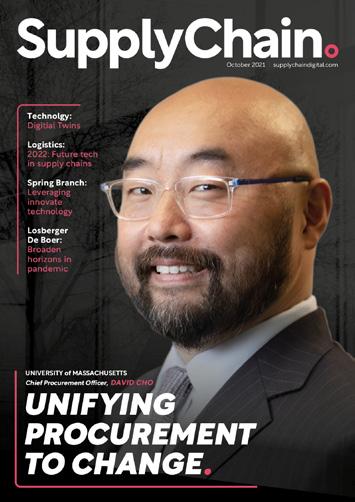

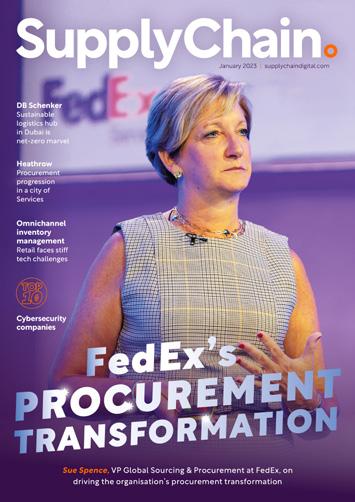
































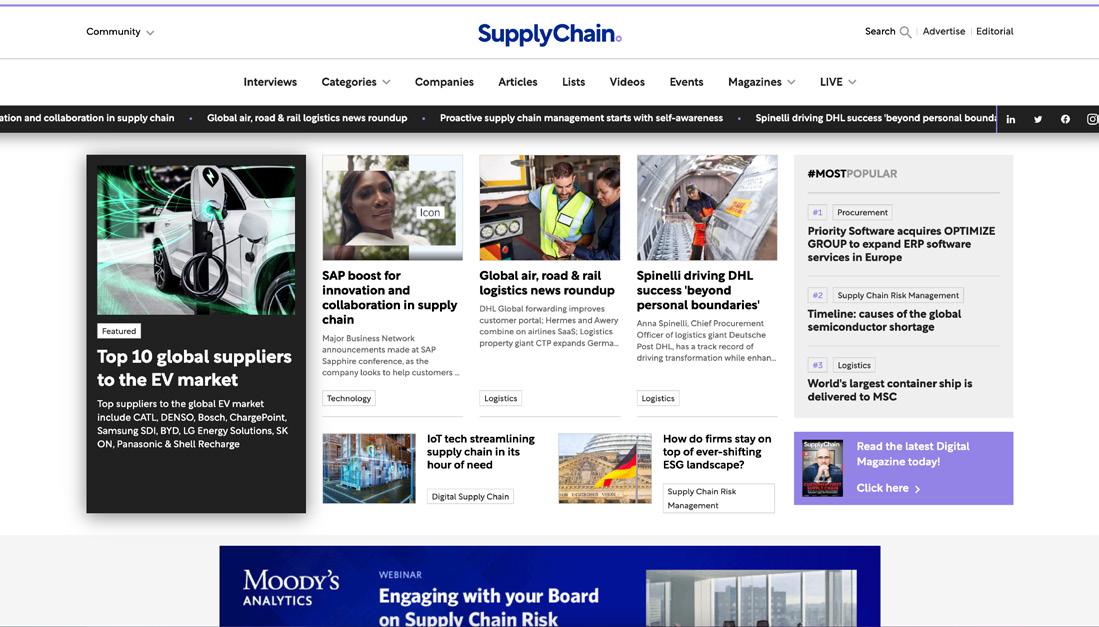



EDITOR-IN-CHIEF
SEAN ASHCROFT
CHIEF CONTENT OFFICER
SCOTT BIRCH
MANAGING EDITOR
NEIL PERRY
CHIEF DESIGN OFFICER
MATT JOHNSON
HEAD OF DESIGN/


SUPPLYCHAIN LEAD DESIGNER
ANDY WOOLLACOTT
FEATURE DESIGNERS
MIMI GUNN
SOPHIE-ANN PINNELL
HECTOR PENROSE
SAM HUBBARD
REBEKAH BIRLESON
JULIA WAINWRIGHT
ADVERT DESIGNERS
JORDAN WOOD
DANILO CARDOSO
CALLUM HOOD
VIDEO PRODUCTION MANAGER
KIERAN WAITE
SENIOR VIDEOGRAPHER
HUDSON MELDRUM
DIGITAL VIDEO PRODUCERS
ERNEST DE NEVE
THOMAS EASTERFORD
DREW HARDMAN
SALLY MOUSTAFA
PRODUCTION DIRECTORS
GEORGIA ALLEN
DANIELA KIANICKOVÁ
PRODUCTION MANAGERS
JANE ARNETA
MARIA GONZALEZ
YEVHENIIA SUBBOTINA
MARKETING MANAGER
KATHRYN WEBB
PROJECT DIRECTORS
STUART IRVING
JAMES BERRY
MEDIA SALES DIRECTOR
JAMES WHITE
MANAGING DIRECTOR
LEWIS VAUGHAN
CEO
GLEN WHITE
TECHNOLOGY MIGHT BE ADVANCING AT A DIZZYING SPEED BUT NONE OF IT MATTERS A JOT IF NOT UNDERPINNED AND INFORMED BY STRONG HUMAN RELATIONS
Strong supplier relations have always been critically important for an efficient and cost effective supply chain. In today’s uncertain world, though, it has never been more crucIal.
In the past, such a thing might have been called having an ‘in-the-round’ view of supply chain. Now, people are more likely to refer to it as having a 360-degree view of the supply chain, or of having end-to-end visibility.

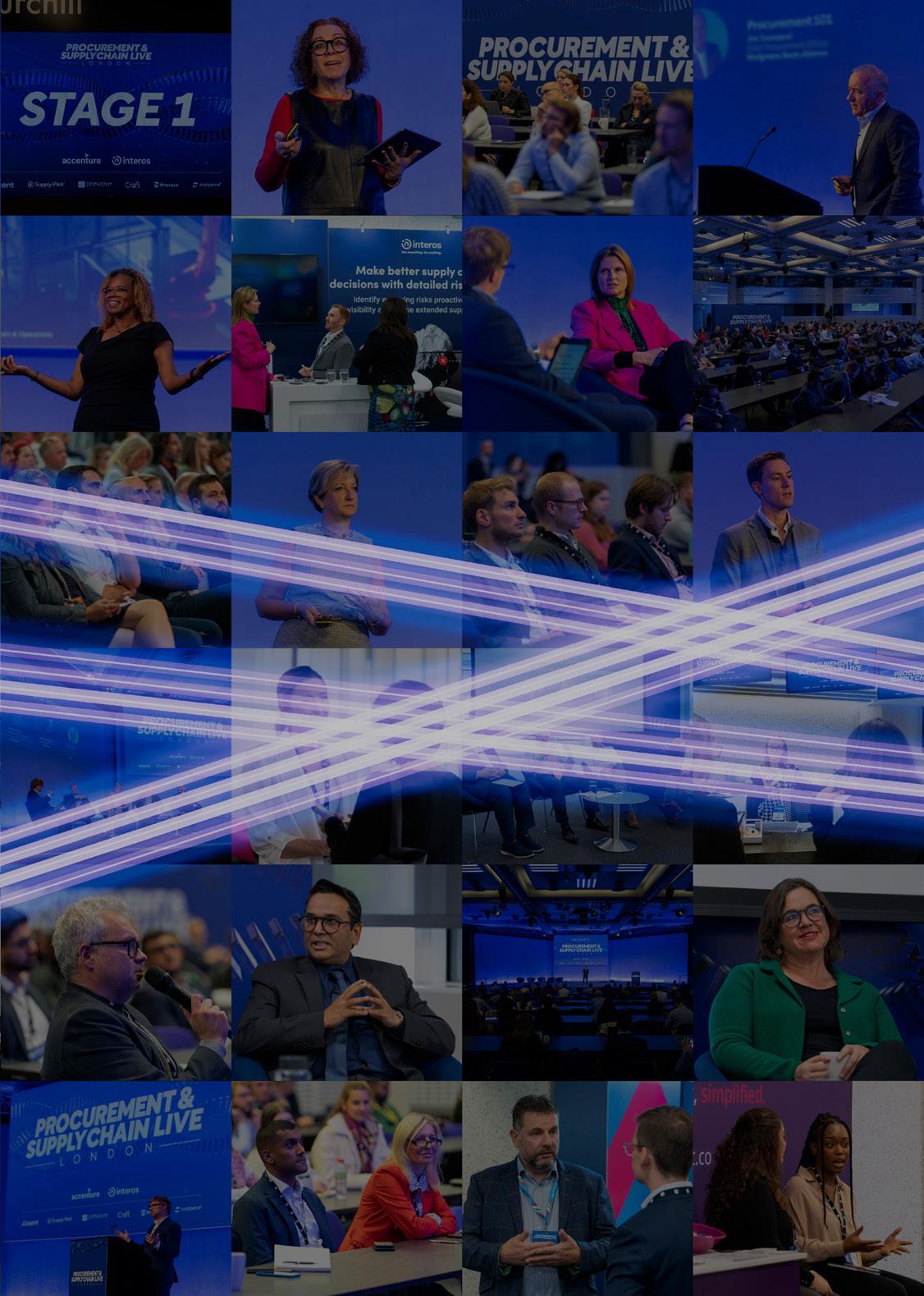


It’s not just the language that has changed of course; technology has moved on – and continues to move on – at a dizzying pace. Data is the currency of supply chain visibility.
But what is the currency of data? That’s simple: relationships. Supply chain, like life itself, is built on relationships.
And like all relationships, it’s a two-way street. Suppliers want to build strong relations because this is what gives them preferred supplier status. Organisations want the same thing, because such relationships help add value outside of supplier contracts, and when scaled-up these benefits bring resilience.
In this issue we explore supplier relations in depth, and it’s a timely reminder that technology, however awe inspiring, comes in a distant second to supply chain’s most important assets. People.
SEAN ASHCROFT
sean.ashcroft@bizclikmedia.com

“Supply chain, like life itself, is built on relationships”



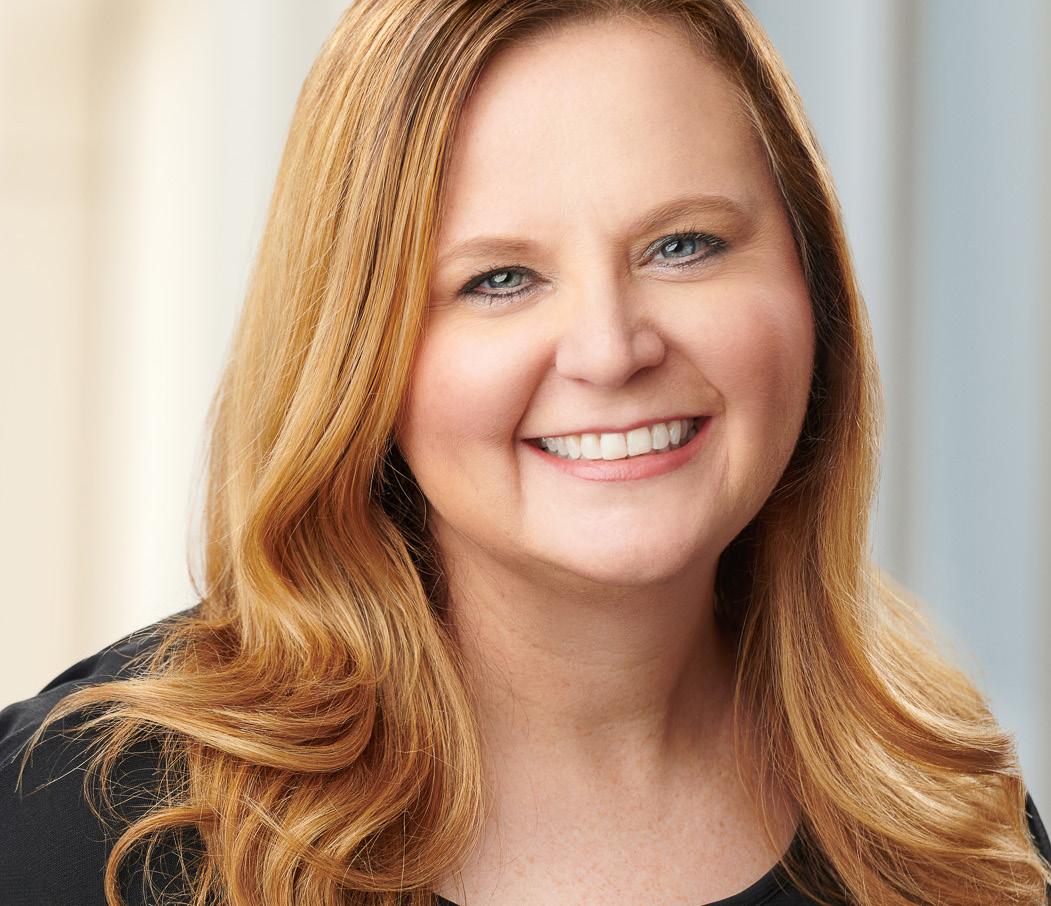
040 COVER FEATURE INTERVIEW: GEP ON GEN AI
026 TOP 10 Supply chain events 2023/24
040 INTERVIEW
GEP on Gen AI in procurement, with President and Co-Founder of GEP, Neha Shah


050 AMERCAREROYAL Transformation drives AmerCareRoyal to an industry leader
074 SUPPLY CHAIN Strong supplier relations keep supply chains moving
086 HYLAND AND WORKDAY
Challenges in supply chain processes need smart and partnered solutions









26 - 27 September 2023
Business Design Centre, London
SPONSORSHIPS GET YOUR PASS
100 LOGISTICS
Latin America is seeing an e-commerce boom but poor service levels are eroding trust and harming progress
110 FRACHT US International freight forwarder Fracht US has digitally transformed, improving life both for the company and its customers

126 SUSTAINABILITY
Volvo Trucks is leading the way in EV production for logistics sector, as businesses like DHL Supply Chain and DFDS add e-trucks to their fleets

138 AB INBEV
Jacques Els, Procurement & Sustainability Director: BU
Southeast Africa, discusses AB InBev’s sustainable delivery of Africa’s developing supply chain

152 TECHNOLOGY
Data is the true currency of Industrial IoT tech























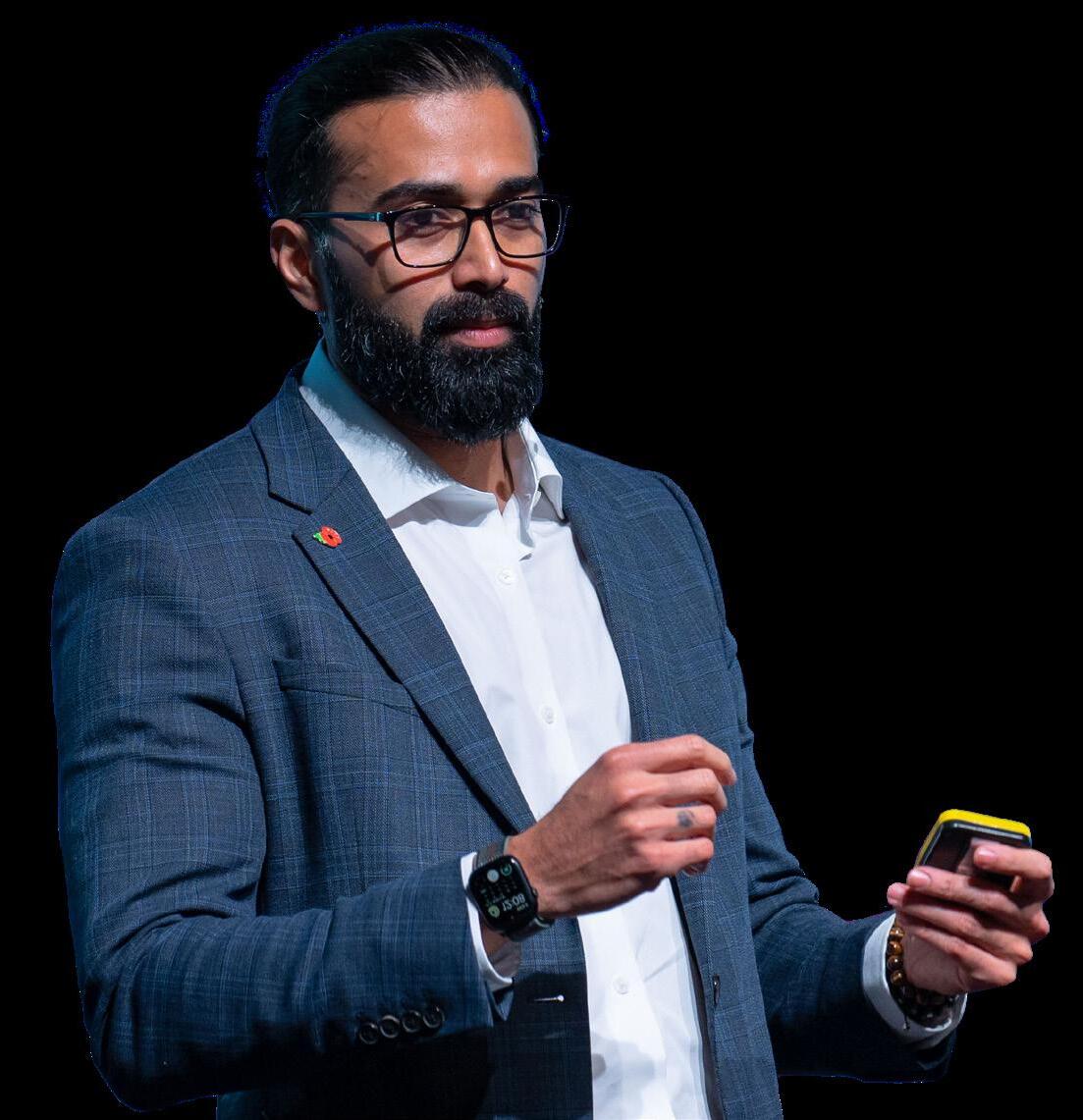

Global sugar prices are expected to continue to rise in the run-up to December, having already increased sharply this year – a massive 42% in June alone. The problem has been caused by extreme weather in key producing nations, including India, Brazil, Thailand and China, with drought a major cause. India is the largest producer of sugar, with around 34 million tonnes a year, and Uttar Pradesh is its biggest sugar producing region.

Nuce-Hilton is SVP, Innovation & Partnerships US with international supply chain standards body, GS1 US
» GS1 is a not-for-profit organisation whose job is to help our members implement global supply chain standards for unique identification, data capture and data sharing between trading partners. GS1 US is part of GS1 global and is the largest of the 116 member organisations.
» I lead the Innovation & Partnerships team. We look at how emerging technology can support supply chain business processes to drive positive business outcomes. Before GS1 I was working in supply chain on data management and software, and also spent time in various supply chain and consulting roles.
When I first joined GS1 US, I was leading our apparel and general
merchandise industry engagement group, working with leading brand manufacturers, retailers and other trading partners to help them assess how leveraging global standards can build consumer trust and deliver improved supply chain efficiency.
» GS1 Standards create a common foundation for business by identifying, accurately capturing and automatically sharing vital information about products, locations, assets and more, in a consistent, repeatable way that scales across industries.
If stakeholders have different processes and systems, straightforward information sharing can waste time and be highly susceptible to human error.

“To meet consumer demands, companies need complete, accurate and trusted data to back up their claims”
MELANIE NUCE-HILTON
TITLE: SENIOR VP, INNOVATION & PARTNERSHIPS
COMPANY: GS1 US
Nuce-Hilton is an experienced leader in innovation, partnership development, product management, marketing, and operations. She has a background in retail supply chain, e-commerce, software and services.

» It’s no longer enough for a company to just say its operations are sustainable, its raw materials are ethically sourced or its products are made from recycled materials – they must be able to prove it.
This is where GS1 Standards play a pivotal role. To meet consumer demands, companies need complete, accurate and trusted data to back up their claims. As this data continues to be collected, digitised and shared in a standardised way, companies have what they need for verified transparency with trading partners and customers.
» GS1 US is leading the industry toward a migration to on-pack 2D barcodes, such as QR codes. The 1D UPC barcode we’re all familiar with will coexist onpack with 2D barcodes for some time. The 2D barcode is extremely valuable
“GS1 Standards create a common foundation that is repeatable and can be scaled across industries”
because the amount of data contained delivers a wealth of consumer-engaging experiences and opportunities, while also ensuring trusted, vital brand information for consumers and enhancing many back office supply chain functions.
I see such global standards being leveraged in a better way as a means of enhanced collaboration. By leveraging globally recognised and accepted GS1 Standards, organisations can communicate with the same, consistent language.
Those same GS1 Standards also provide the unique and persistent identification to support sustainability. That unique identifier – like a Global Trade Item Number – follows items and raw materials through the product life cycle.

Looking ahead, global standards will continue to evolve to meet the more specific demands for sustainability attributions, certifications and
disclosures. Product labelling will be a huge piece of that. The increase in demand from consumers for more information is changing the future of labels, and standards are a critical enabler.
» My team inspires me to be better every day. They bring so much perspective and passion to work, trying to solve the business challenges that we can’t even see yet.
Innovation means pushing the boundaries, being an advocate for change, and also an agent for change but in a practical way. Without multiple viewpoints on the world how can we truly innovate and make an impact that the world can feel?
» Fail, and fail fast. You’ll learn from it and be stronger when you come out on the other side.
Lior Ron is an Israeli-born businessman who served in the Israel defence forces from 1997 to 2004.
In his commercial life, Ron rose to become Product Lead for Google Maps and then Product Lead for Motorola Mobility, which was acquired by Google in 2011.
In 2016 he left Google to found Otto, a company that makes selfdriving kits to retrofit big-rig trucks.
Quoted in Wired, Ron said he left Google because he “felt an obligation to bring this technology to society sooner rather than later”. In an industry where there’s a 30% chance that a truck next to you on the road is empty, it has always been Ron’s mission to change this as soon as possible.
Otto launched in May, 2016 and was acquired by Uber in late July the same
year. The Uber partnership allowed Ron and Otto the opportunity to develop a freight marketplace for truck drivers.
The Uber Freight app is designed for vetted and approved drivers who can browse for nearby available loads, see destination info, distance required and payment upfront and then tap to book.
Uber Freight serves shippers of all sizes, from Fortune 500 companies to small independent businesses, and it helps marshalls the estimated 1.7 million truck drivers across North America who are on it.
The platform also opens up a new revenue stream for truck companies, which now have another way to book and process loads.
In an interview as part of McKinsey’s Logistics Disruptors series, Ron says


“With the greater utilisation of trucks carriers can also increase their earning power”
that Uber Freight connects shippers to carriers with capacity by “standing on the shoulders of a giant”.
At a time when the trucking industry is battling rising fuel prices, worsening inefficiency, and difficulties recruiting drivers, Ron says his mission is to “simplify logistics to help communities thrive”
He adds that the aim of Uber Freight is to “simplify the movement of goods and streamline the process by digitising all of the supply chain infrastructure”.
It is this that minimises empty miles and makes the trucking profession friendlier for carriers.
“By releasing this additional capacity, costs should go down and shippers can also streamline their logistics and supply chains,” says Ron.
He adds that, with the greater utilisation of trucks, carriers can also increase their earning power.
“Essentially, we’re connecting supply and demand in a digital, scalable way,” he tells McKinsey.
Asked how the relationships that underpin logistics can possibly be digitised, Ron says Uber Freight helps businesses embrace relationships and augment them with technology.
“Our fundamental belief is that technology is the best way to support and build trust,” he says, adding: “When you ride with Uber, you trust that your car will be there within the displayed time. There’s tons of technology behind the scenes that makes this possible. The same is true for Uber Freight.”
Ron continues: “We have the largest digitally enabled carrier network in the market. Our technology enables companies to recover from cancellations much faster than any manual model, just like how your Uber app automatically assigns you another driver if one cancels.”
Ron points out that in trucking around 15% of daily shipments are cancelled because of weather, traffic, waiting time in facilities, or other reasons.
“We help businesses recover from these cancellations almost 90% of the time,” he explains. “A new carrier is automatically assigned and the disruption is smoothened. That’s unheard of in logistics, and it’s how we build trust.
Tellingly, he adds: “Quite simply, we’re Uber for trucks”.
UBER FREIGHT IS ONE OF THE WORLD’S LARGEST LOGISTICS AND TRANSPORTATION NETWORKS
“Quite simply, we’re Uber for trucks”

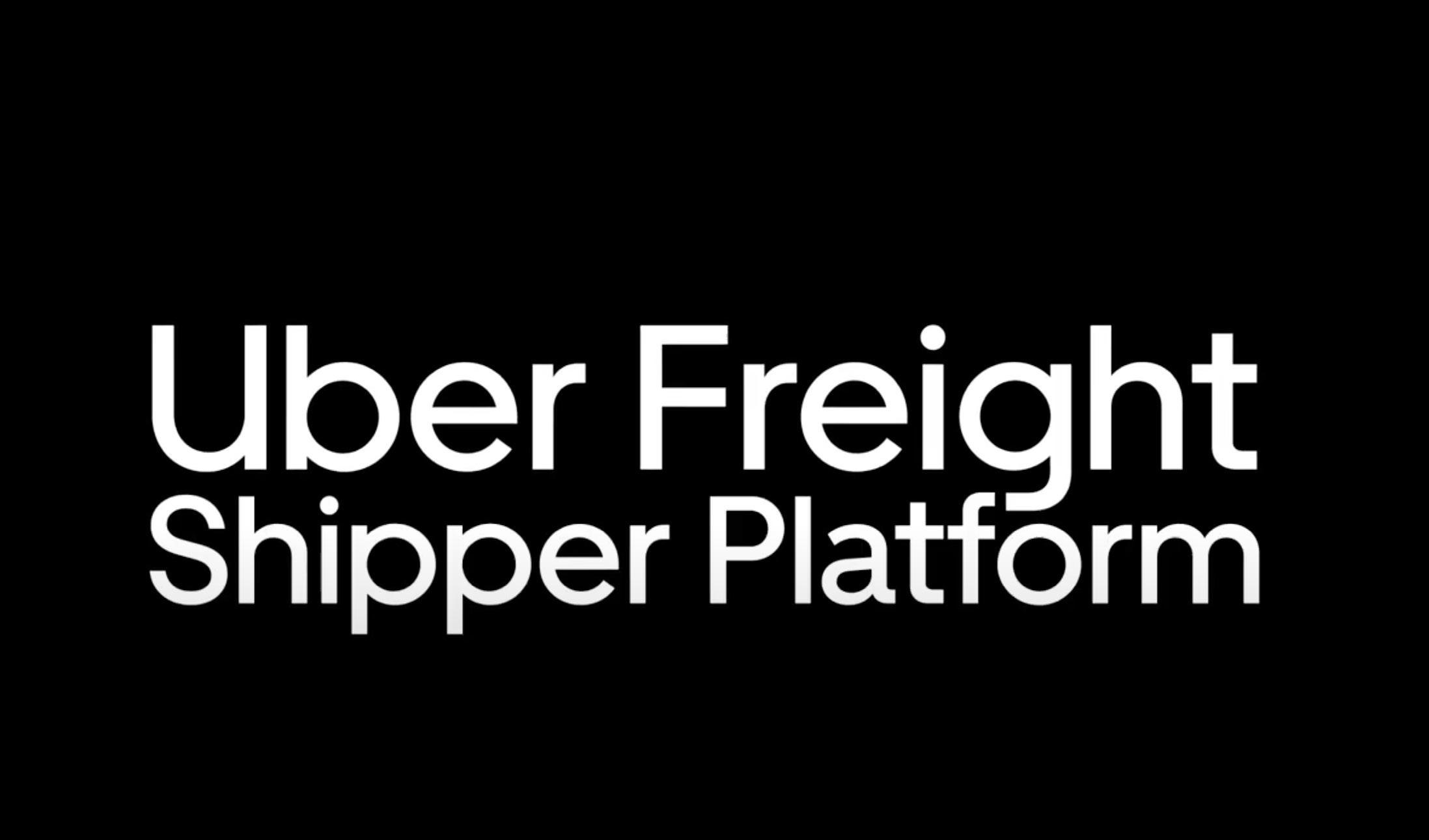
Streamline purchasing while saving on everyday supplies so you can focus on growing your business.



Enjoy great discounts, starting from just two units, on over 4 million products from the most trusted brands.
Get unlimited, FREE delivery on eligible orders for everyone on your business account, plus more benefits.
Connect your teams, create purchasing groups and share payment methods. Create a free account
Here, we take a look at the leading procurement, supply chain & logistics conferences taking place in the remainder of 2023 and into 2024. These are among the the top supply chain conferences, expos and industry events, all of which give leading figures from supply chain, procurement and logistics the opportunity to share insight, knowledge and experience. Armed with this, they are better placed to help their organisations navigate supply chain disruption, economic volatility and geopolitical uncertainty. Such events also help executives discover opportunities around procurement transformation, global logistics strategies and supply chain digitalisation.
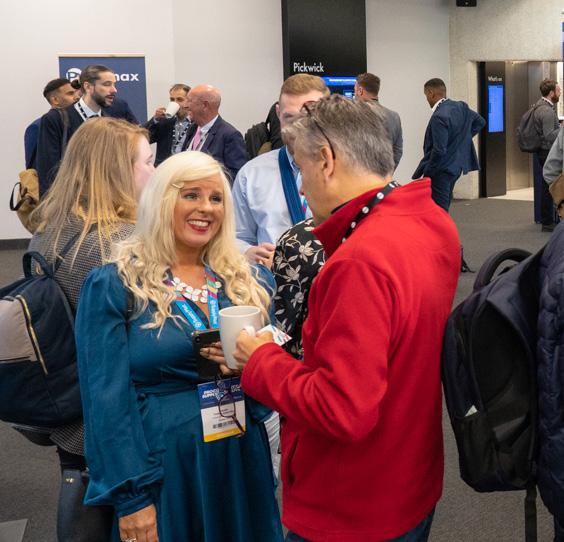

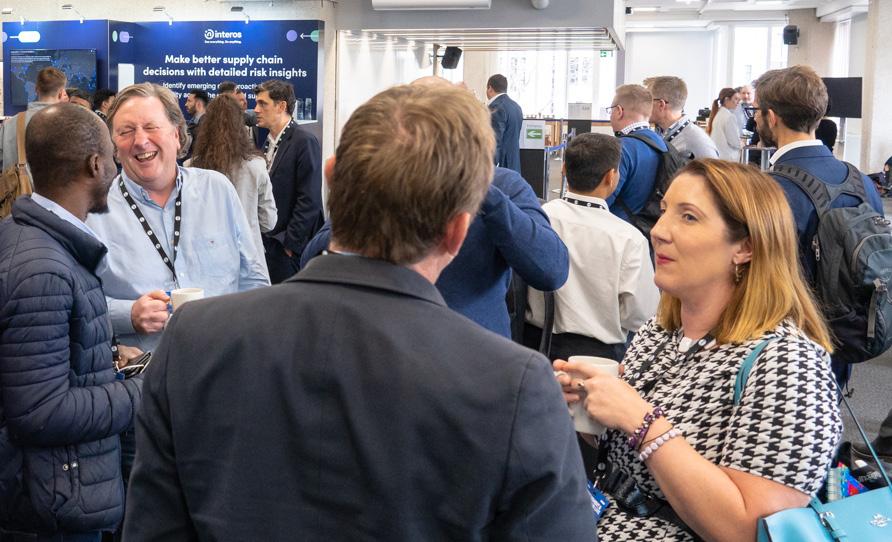
When: March 11-14, 2024
Location: Georgia, USA Company: MHI
As the speed of manufacturing and supply chain operations continues to accelerate, the future of the industry depends on forwardthinking decisions. MODEX 2024 is a leading manufacturing and supply chain show where buyers come to engage one-to-one with solution providers and supply chain experts.

The event showcases emerging technologies and equipment, and helps businesses future-proof their supply chains. It features 150 free education sessions as well as powerful keynote addresses.
09
When: 24-25 October, 2023
Location: Brussels, Belgium
Company: Reuters Events
Reuters Events’ Supply Chain Europe 2023 brings together the end-to-end supply chain, to, it says, “share new best-practice and strategies for the future as we build the future of supply chain networks”.
Executives from across the supply chain ecosystem –including Fortune 500 retailers & manufacturers, forward-thinking logistics organisations, leading technology solution providers, government officials and industry heavyweights – will come together to share their vision of the future and, Reuters says, “make it a reality”.

Date: 19-20 March 2024
Location: Birmingham, England
Company: Akabo Media
As environmental issues become more important to consumer and business brand owners across all sectors, there is growing demand for supply chains to adopt sustainable practices, become net zero, and adopt effective ESG strategies.
The Sustainable Supply Chain Exhibition allows logistics, supply chain, and sustainability professionals to share ideas, offer solutions and help each other on their sustainable journeys.
Date: 16-17 October
Location: Manchester, England
Company: Forum Events


The Total Supply Chain Summit brings together senior supply chain and logistics executives with leading solution providers in the industry. It features keynote speakers, panel discussions, and interactive workshops on technology and automation, inventory management, transportation and distribution, sustainability, and global supply chain strategies.
Attendees can also participate in one-to-one business meetings with solution providers to learn about new technologies, services, and solutions that can help optimise their supply chain operations.



26 - 27 September 2023
Business Design Centre, London
SPONSORSHIPS GET YOUR PASS
Date: April 30-May 1, 2024
Location: Dallas, Texas, USA
Organiser: Generis
The American Supply Chain Summit is a leadership-focused event whose aim is to improve supply chain and procurement strategy across the globe.

It’s an annual platform for exchanging ideas and collaborating on new technologies for supply chain and operations leaders.
The 2024 event explores case studies on how to navigate supply chain disruption, as well as how workforce management, advanced analytics, process improvement and automation are being rolled out in the world’s best facilities.

It will feature in-depth discussions on innovation, maximising supply chain profitability, increasing visibility and mitigating risk.

Date: May 6-8, 2024
Location: Orlando, Florida, USA
Company: Gartner
Gartner Supply Chain Symposium is an annual conference organised by global research and advisory firm Gartner. It provides insights and advice to businesses in various industries. The conference is focused on supply chain management and logistics, bringing together supply chain professionals, academics, and experts to discuss the latest trends, strategies, and best practices in the field. It features keynote speakers, panel discussions, case studies, and workshops on topics such as supply chain digitalisation, inventory optimisation, logistics and transportation management, supplier relationship management, and sustainability.
Date: 22-23 May, 2024
Location: Atlanta, USA
Company: Reuters Events
At Supply Chain USA 2024, executives from across the supply chain ecosystem covering planning, sourcing, manufacturing and logistics “will gather to confront the most business-critical challenges facing our industry”, says Reuters Events.


Delegates will learn about how to build supply chains that are customercentric. resilient. ESG compliant, cost effective and data driven.
“Few supply chain events focus on the pain points of retailers and manufacturers like Supply Chain USA,” says Reuters. “This is not a vendor fest.”
Date: September 26-28
Location: Barcelona, Spain
Company: Worldwide Business Research
ProcureCon is a series of conferences and events focused on procurement and strategic sourcing. The events bring together procurement professionals from a variety of industries to share best practices, network, and to learn about the latest trends and innovations in procurement.
It features keynote speakers, panel discussions, case studies, and workshops on topics including procurement technology, category management, supplier relationship management, and contract negotiations. Attendees can also participate in roundtable discussions and networking events to connect with other procurement professionals.

Date: October 1-4
Location: Kissimmee, Florida, USA
Host: Council of Supply Chain Management Professionals
CSCMP EDGE is an annual supply chain conference hosted by the Council of Supply Chain Management Professionals (CSCMP). The conference brings together supply chain professionals from around the world to share best practices, network, and learn about the latest trends and innovations in the industry.
The conference typically features keynote speakers, panel discussions, workshops, and an exhibit hall showcasing the latest technologies and services related to supply chain management. Topics covered range from logistics and transportation to inventory management and sustainability.
















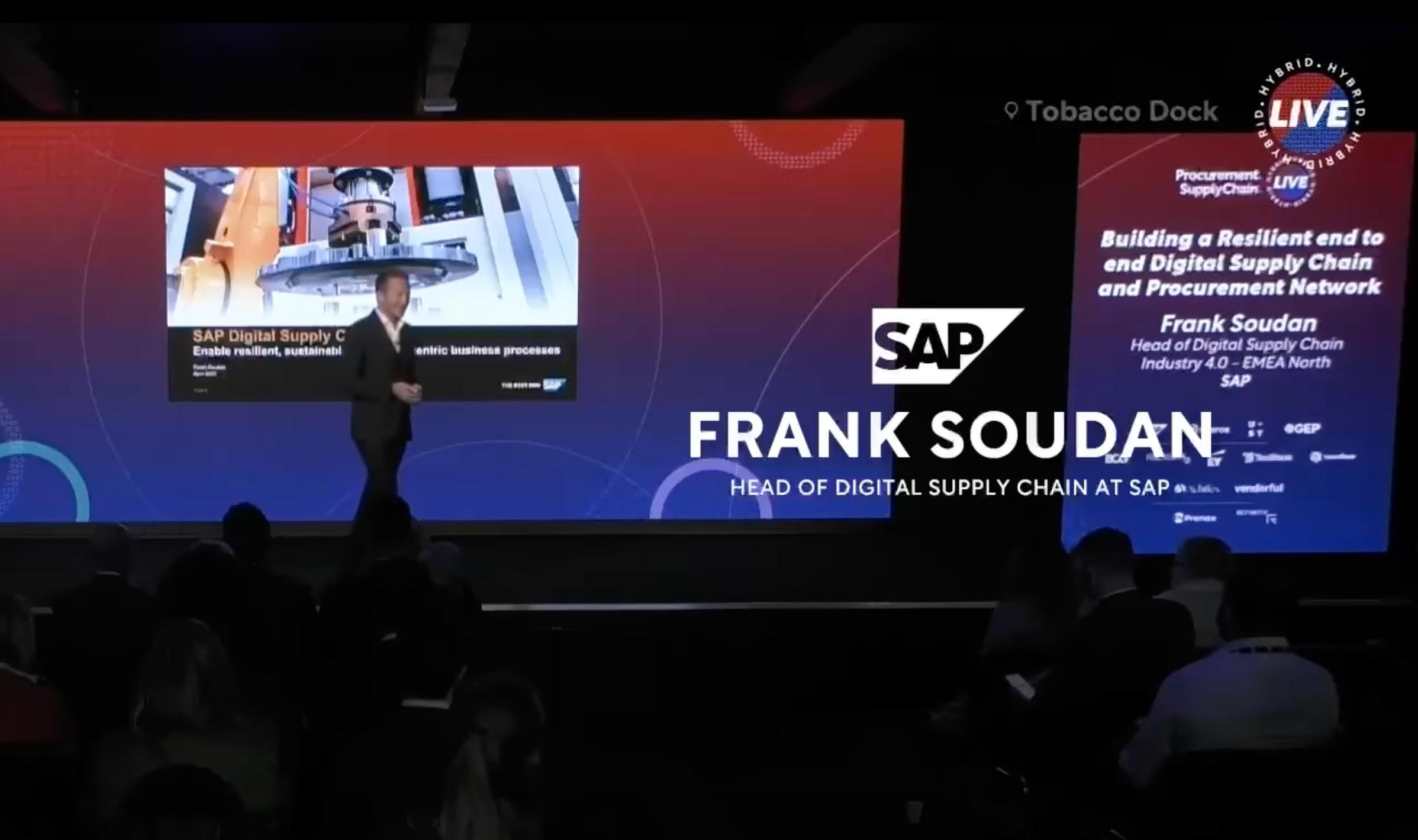





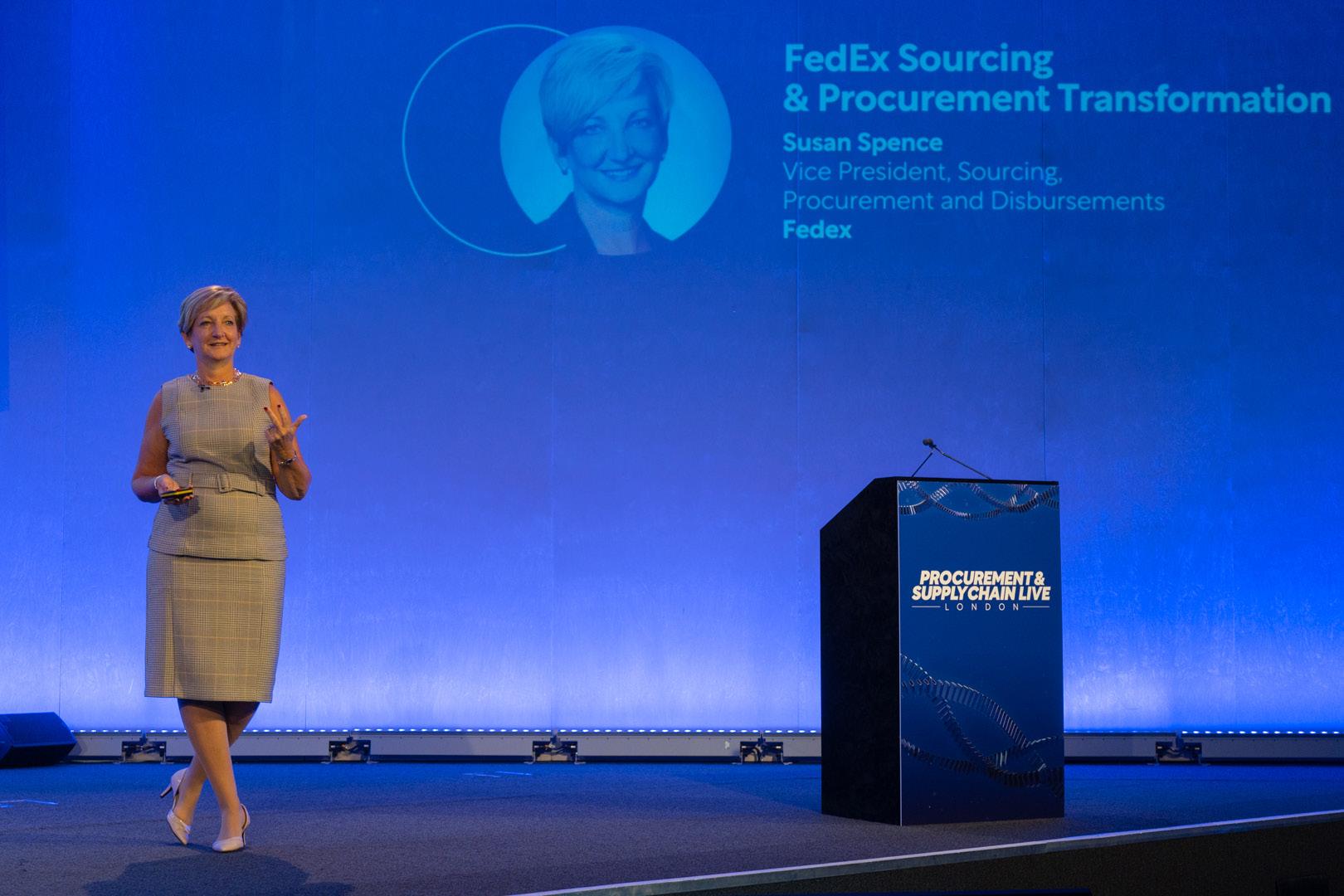
Date: 26-27 September
Location: London, England Company: BizClik
Leading industry figures gather at Procurement & Supply Chain LIVE to discuss the most important and innovative ideas around the world of procurement, supply chain and logistics.

The event includes keynote speakers, fireside chats, interactive workshops and networking opportunities. With around 2,200 attendees, Procurement & SupplyChain LIVE London is the place to meet

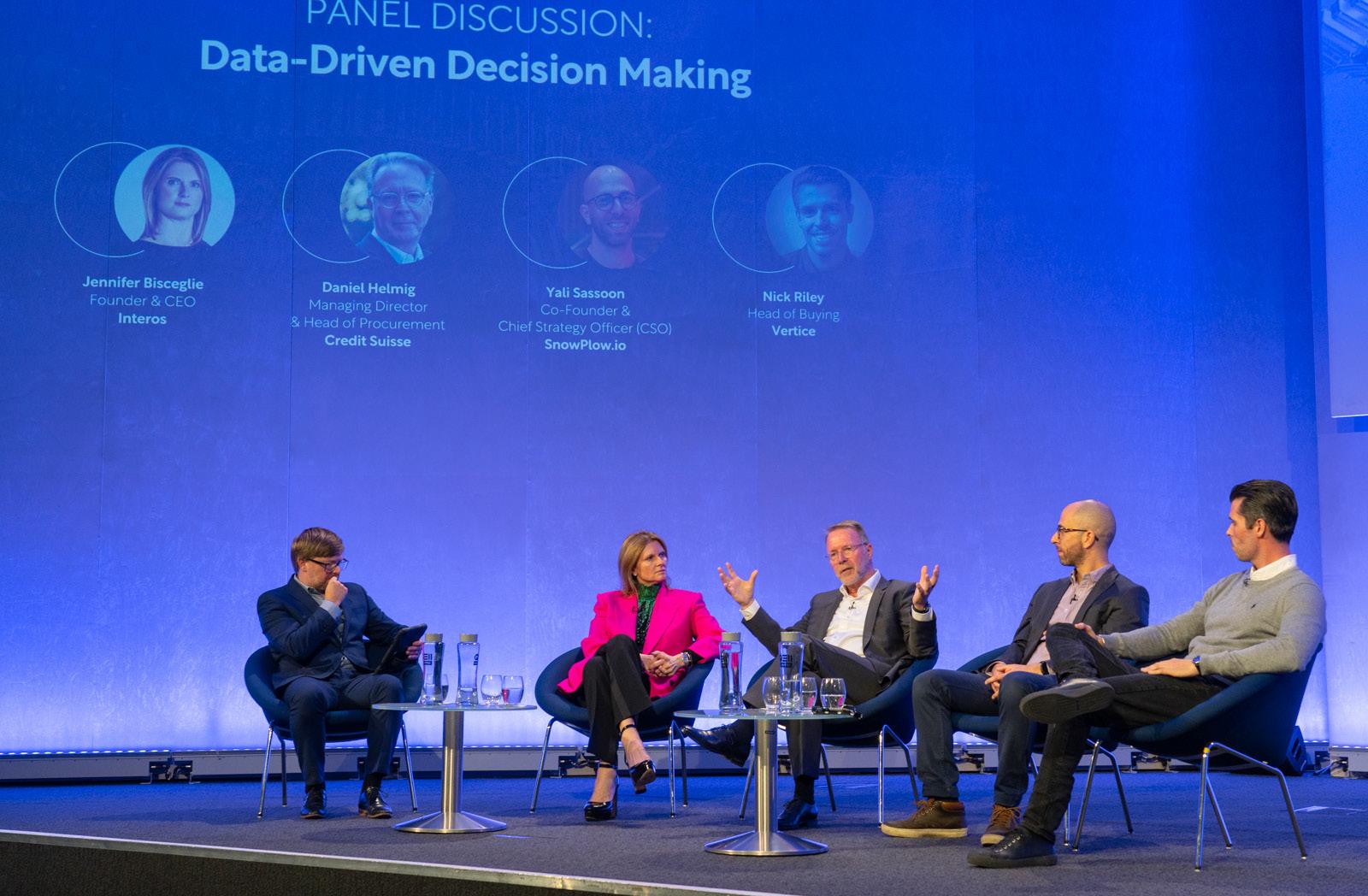
peers and be part of supply chain solutions.
There are two conference stages and a total of eight industry workshops. Speakers include: Alisa Bornstein, Chief Procurement Officer, VISA Europe; Matthew Harris CPO, Logistics & Services, A.P. MollerMaersk; Juud Tempelman Global Chief Procurement Officer, JLL; and Nicholas Wright, Director, Procurement Innovation (Digital & Talent) bp.
The Global Supply Chain Awards 2024 will be celebrating the very best in Procurement & Supply Chain with the following categories:
Procurement Transformation Award
–Digital Supply Chain Award


–Global Logistics Award
–Supplier Diversity Award
–Supply Chain Innovation Award –
Supply Chain Sustainability Award –Procurement Technology Award –
Procurement Consultancy Award –Future Leader Award –Executive of the Year Award
–Project of the Year Award –
Lifetime Achievement Award GET INVOLVED
GET INVOLVED



As President and Co-Founder of GEP, Neha Shah describes herself as an ‘accidental entrepreneur’
WRITTEN BY: NEIL PERRY


Aboom in the 1990s, she always felt that solving problems was more important to her than simply making money. As the company now helps to lead the conversation on the use of AI in the field of procurement and supply chain software, she still warmly looks back on the early days of the company and the strong grounding it has given the leadership team.
“As an early stage company, we had to do it all. I had to do it all from the administrative tasks, all the way to selling to Fortune 500 companies and getting a foot in the door,” she says, “to hiring our first people, to figuring out a plan for our product roadmap and becoming a product manager and learning along the way.”
These phases of growth and development over nearly 25 years of GEP have resulted in one of the world’s leading procurement
• AI-First is an approach that ensures that no stone is left unturned when looking for ways in which they can help customers derive greater value from their supply chain and procurement operations.

• AI-First does not mean AI-Only – far from it. Like any set of tools, how AI is used, and used to best effect, will be determined by the people and how they interpret and act on the information at hand.
a welcome challenge.
“Our next challenge is to continue to scale a fast-growing business while not losing the culture, attracting the greatest talent in the world and still continuing to pivot as the world around us continues to change in this generative AI revolution.”
Growing a company without losing a culture GEP has grown from a small team in a co-founder’s basement, to a world-wide enterprise with 26 global offices, 6,000 employees, customers in more than 100 countries and partnerships with some of the leading companies on the planet.
With so much competition in the space for procurement transformation, with established players and innovative startups continuously entering the fray, why do their clients and customers choose to partner with GEP? Shah briefly considers the question, but is emphatic in her reasoning why companies choose them over other worthy competitors.
“For most organisations these days, they want a long-term partner who is going to solve problems and be there with them every step of the way. At GEP, given that we’re founder-led, that we’re not just a startup with a nice new toy, but have been around for 25 years with the founders fully embedded in the business and working with a much longer term vision for the company,” she explains. “They believe in us. They believe in our people, our leadership team, and our product and expertise that we bring. All we do is live and breathe procurement and supply chain.”
26 global offices
6000 employees worldwide Customers in more than


100 countries




She also speaks with genuine passion about the role a company like GEP can play in helping their partners in the age of sustainability and all forms of ESG. She believes procurement and supply chain is the most important driver in helping companies reach their targets on climate change, decarbonisation, water usage, human rights, and living wage.
“GEP is playing a role in setting the targets and strategy for these large organisations and even mid-size organisations,” says Shah. “But to make that happen, it is all about the day-to-day processes and decisions that happen every single day for a company to run.”
If that is one way she feels GEP can help make a positive difference at every partner they work with, and every deal they help facilitate, Shah is certain they also have to lead the way both in the responsible use of Gen-AI, but in digital transformation of business.
“It’s very important for GEP to, what I’ll call, take its own medicine, but also be thinking three steps ahead. Really in some respects, predicting where the future is,” she says, knowing that if they are helping to guide others through digital transformations and evolutions, they as a company need to be beyond the leading edge of that same technology.
This leads to the subject of the value, potential and change being delivered daily by generative AI, that has exploded into the consciousness of the wider-public in 2023.

The intelligent implementation of AI technology is a subject that clearly inspires Shah, as she speaks excitedly about the ever growing potential, but realistically about knowing it is up to companies like GEP to be at the forefront of responsible implementation.
“At a GEP level, it’s AI, every day 24/7. When I think about AI, of course it’s
“I think it’s really important for GEP to take that leadership role, to cut through the hype”
NEHA SHAH PRESIDENT AND CO-FOUNDER, GEP
TITLE: PRESIDENT AND CO-FOUNDER
COMPANY: GEP
INDUSTRY: SOFTWARE, CONSULTING, AND SERVICES

LOCATION: CLARK, NEW JERSEY
As a co-founder of GEP, Neha Shah is an innovative, purpose-driven entrepreneur and executive. She has been instrumental in building and growing multinational organisations through her innovative strategies and decisive leadership.



artificial intelligence. I like to think about it as augmented intelligence,” she explains. “What I’m finding is that there’s tremendous potential, and yes, there are some real concerns and I can’t predict what is going to happen, but I do believe that I see a tremendous opportunity for augmenting the people and what they’re able to do in a 10-hour or 8-hour day.”
One word she regularly returns to is ‘hype’. “I think it’s really important for GEP to take that leadership role, to cut through the hype. I will say that I think there’s a lot of individuals who, because they don’t know where to start, it all feels like hype.”
Her focus is making sure that the importance of using AI intelligently is never overlooked, given the boundless potential of the technology, and breaking it down into micro-steps and processes to ensure they serve their intended purpose. She knows
that AI without true tangible value to her customers, is not the kind of progress GEP’s partners expect.
“I think for us at GEP, it’s all about AI every single day, internally and externally, and applying that knowledge to our customers. How do we now apply these wonderful large language models that are coming out?” she says, knowing the tremendous speed of change. “How do we apply the large language models and really make a difference in some of these processes using proprietary data? That is what is at the heart of everything GEP is doing, so our platform and our advice and expertise to clients is what we can provide and really help them transform this new world.”
The future of AI and GEP
Neha Shah takes the responsibility of being at the forefront of the AI age extremely

• There is currently very limited guidance on industry standard practice and ways to minimise organisational risks during adoption.
• A procurement team needs to keep a high level of control to make sure AI tools deliver ethical, responsible and reliable solutions.
• There is a role for various business functions in the deployment of AI solutions including product teams, IT, legal and procurement.
seriously, knowing the GEP plays a crucial role in supporting their clients, but also contributing to the wider conversation of how the technology can be responsibly implemented.
“The pace is so fast, it’s hard for a normal procurement supply chain function or professional to keep up. So our job is to keep up to date and then give the right advice,”
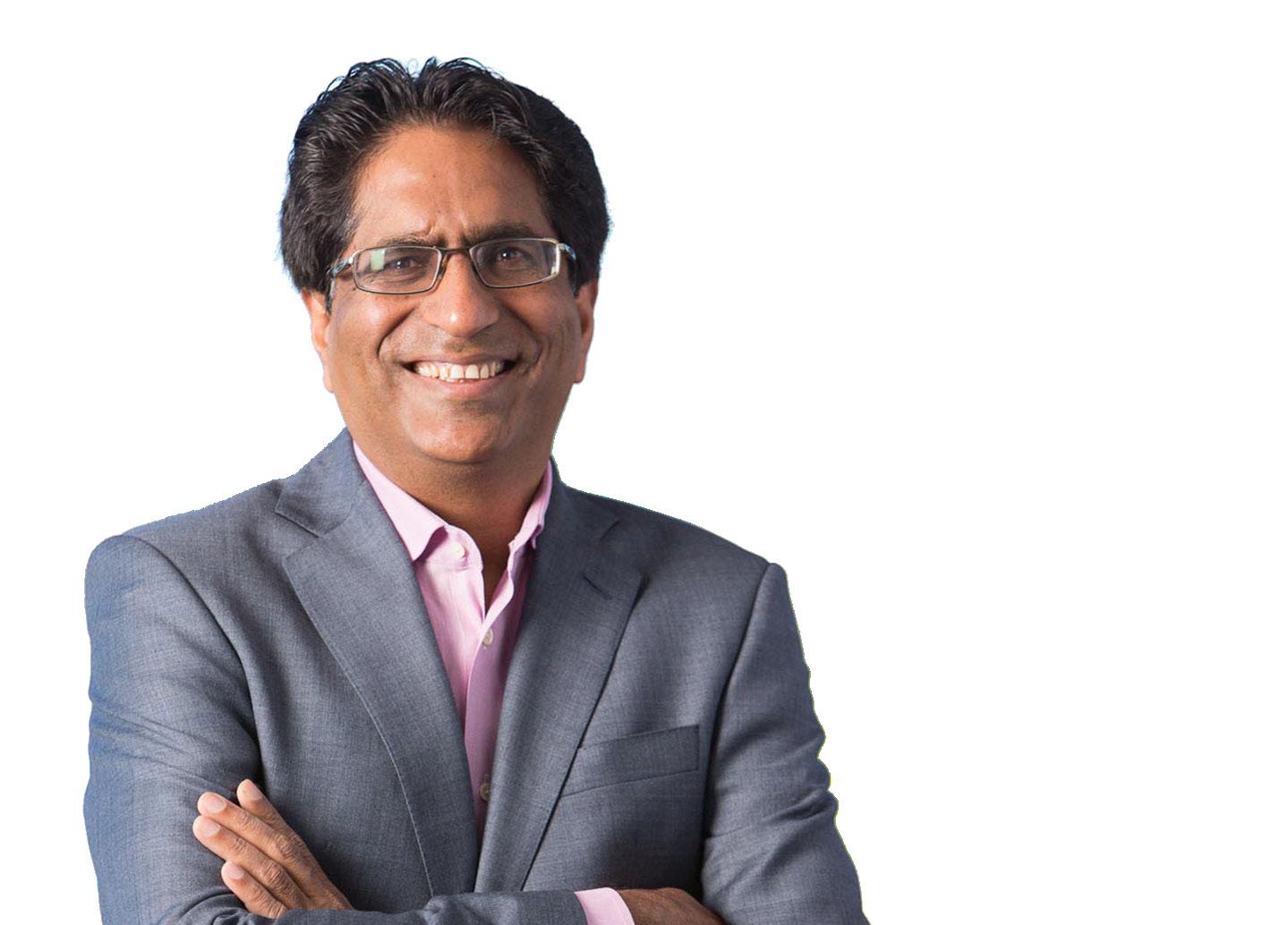
SUBHASH MAKHIJA, CEO AND CO-FOUNDER, GEP
“In the gold rush to apply AI to improve how companies source suppliers and manage global supply chains, there is a very real risk that organisations will dehumanise decisions and unintentionally ignore waste, Co2 emissions, and inequality, with devastating consequences to business, communities and the environment”
very limited guidance on industry standard practice and ways to minimise organisational risks during adoption, and that a procurement team needs to keep a high level of control to make sure AI tools deliver ethical, responsible and reliable solutions.

Shah never loses sight of the obvious potential of the technology, and explains how by helping to lead in the field, they are already implementing it into their offering. One such example is their Total Inventory Management Solution.
“It’s really remarkable. What we’re doing is in partnership with an organisation called Eliant Inventory Solutions, which is made up of different backers, Apollo, Athene, and B N P Paribas. We are enabling clients where we, GEP, provide the technology hub to free up working capital that is tied to the inventory that’s sitting in warehouses and allow clients to improve supply chain visibility and resilience,” she explains. “We bring the digital technology hub, if there’s parts of a process
that can’t be digitised, we bring some of our talent through our managed services team.
“We have customers like one of the world’s leading largest technology companies who are utilising this hub and they’re running their supply chain for some of their, what we call high volume, high value products.”
Shah speaks warmly about her passion for solving problems, helping people solve their own, and cutting through the hype to help her customers achieve in the age of AI, but what are the touch points that convince her she has achieved her goals in any given day?
“Because of the platform of GEP, particularly as it relates to ESG, how am I making a broader impact on the things I really care about, like seeing the end of child labour and trafficking in the world,” she says. “I really care about that and how in the dayto-day work I’m doing, how is that enhancing what I want to see in a better society, a better local community, regional community and a better world? It’s so important and that’s what keeps me going.”
“When I think about AI, of course it’s artificial intelligence. I like to think about it as augmented intelligence”
NEHA SHAH PRESIDENT AND CO-FOUNDER, GEP
 WRITTEN BY: MARCUS LAW
WRITTEN BY: MARCUS LAW

Formed by a number of acquisitions, we highlight the path, challenges, and success of disposables and supply chain leader ACR’s digital transformation

Since it was formed with the initial platform in 2014, AmerCareRoyal (ACR) has been on an incredible journey building scale and breadth to become an industryleading platform.
Its products are consumed in every part of the North American foodservice industry,
including large international restaurant chains, emerging regional organisations, local neighbourhood eateries, cafeterias, and institutional feeders, and the broadline and supply distributors that serve them all. Major brands like Five Guys, Tim Horton’s and Yum Brands, and hundreds of other brands that operate and distribute to restaurants trust
ACR as a single-stream resource for over 6,000 disposable products used to keep their businesses humming.
“We’ve transformed from a regional player to a leading national supplier of disposable products across 20 categories in the food service industry,” comments Brett Barnello, ACR’s Chief Operating Officer. “We have

unmatched infrastructure and product breadth. We have over 6,000 product SKUs. We’re roughly a billion in revenue today, and we have an aspirational growth plan to triple that to be at US$3bn in five years or so.”

As Jeff DeSandre, ACR’s Chief Information Officer, describes, what is particularly notable about the organisation is that it is greater than the sum of its parts.
“If you add up the nine acquisitions that we’ve made to form ACR, they equate to less than our current revenue,” he explains. “The work that’s being done here allows for synergising. There is a large portion of organic growth that’s part of this acquisitive growth and I think that’s pretty interesting that the sum of the component parts is less than what we are today.”
The COVID-19 pandemic caused welldocumented disruption on a global scale, with ACR’s supply chains no exception. ACR leverages domestic manufacturing and international sourcing, which amounts to a truly global supply chain, so it was greatly impacted by the pandemic.
However, as Barnello points out, the company’s supply chain issues were not solely pandemic-induced. In fact, ACR was already grappling with growing pains in the pre-pandemic period. As Barnello states, these challenges involved stitching a number of small business units together and linking those and creating synergies.
“The pandemic was another in a series of this unprecedented global supply chain disruption and how we fare and manage through that,” he explains. “Then, the challenge was to not only survive the day-

TITLE: CHIEF OPERATING OFFICER
COMPANY: AMERCAREROYAL
INDUSTRY: FOODSERVICE
LOCATION: US
Barnello has over 25 years of Supply Chain experience in consumer businesses. He is a proven leader with a consistent record of organisational success through sustained results-oriented focus and innovative processes, products, and services. He develops, motivates, and builds organisations and partners with colleagues with a relentless focus on business imperatives.
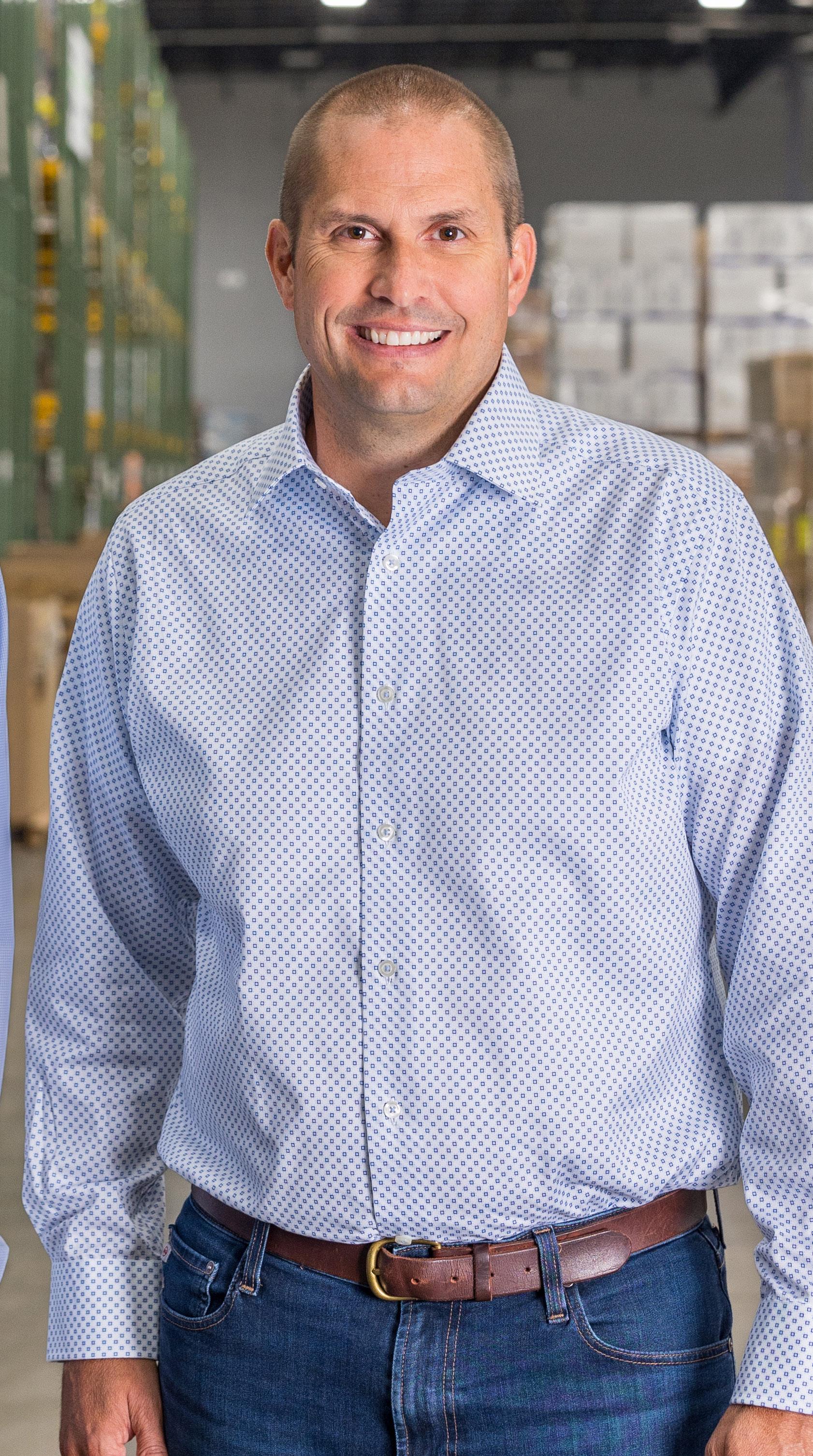
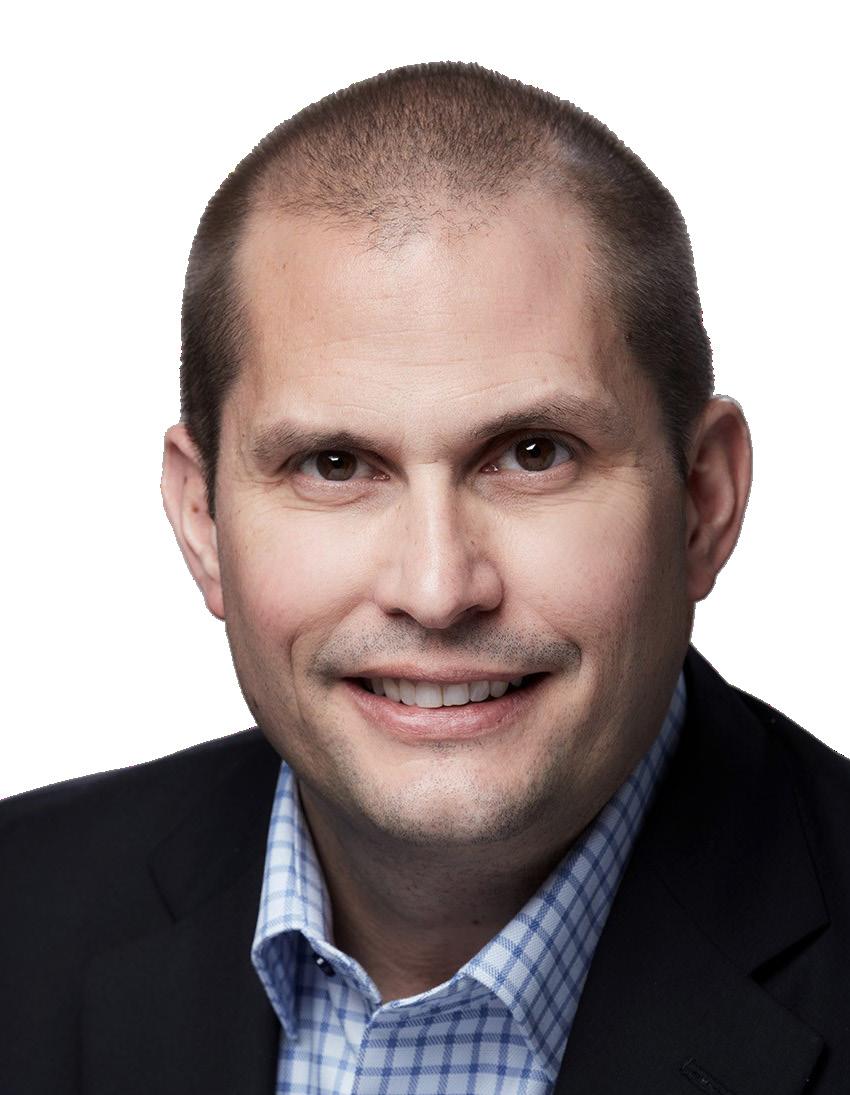

Development backlogs are unique combinations of company goals, requirements, and constraints. As a company's needs change, our flexible engagement models adapt, and we back our work with an industry-unique Happiness Guarantee.

Kip Kugler, SVP of Sales, explains how Programmers.io’s unique skill set leaves the company well-placed to deliver firstclass customer service to clients
For Programmers.io, an on-demand provider of software development professionals, commitment to great customer service starts at the very top.
“Anshul Choudhry, our Founder, is extremely passionate about doing the right thing,” says Kip Kugler, SVP Sales. “If customers aren’t happy, they don’t have to pay. We may have eight or nine months of great work together but, if something doesn’t feel right in month 10, we won’t invoice and we’ll make a plan to fix it.”
“To this point, I haven’t had any customers leave because they’re unhappy.”
Programmers.io boasts unique skills
Programmers.io specialises in assisting the tens of thousands of US companies using IBM iSeries (AS/400), while also working on at least 50 other programming languages.

The lack of college students learning legacy languages means there exists a distinct shortage of workers – which is where Programmers.io comes in. A key priority for modern-day CIOs in terms
of future-proofing, Kugler explains, is deciding whether or not to migrate away from iSeries. He continues: “iSeries is so reliable and consistent that we say to people ‘we’ve got the workforce and we’ve got the ability to help you stay there longer – you don’t have to take that risk yet.”
AmerCareRoyal benefits from Programmers.io expertise
In recent years, Programmers.io has worked closely with AmerCareRoyal, a producer of disposable supplies that uses a unique legacy ERP system built on iSeries.

Kugler explains: “The issue for AmerCareRoyal is finding the relevant workforce. It’s not just about knowing the legacy programming language, but also the specific ERP – and we have that skill set.” The pair have worked together on countless projects relating to warehouse and pricing metrics, purchase order functionality, and vendor and order management.
“It’s a collaboration, but we see ourselves as an extension of their team,” adds Kugler. “We guarantee a budget-friendly environment with unique skills that are hard to find.”
to-day of the pandemic, but actually also on a separate track start to think beyond the pandemic and how we come out stronger and more stabilised.
“We knew everyone would come out of the pandemic at the same time, but some would be worse off than others. For us, our goal was to be stronger and have corrected systems and processes and different people capability.”
As DeSandre describes, ACR’s transformation began with the transformation of its leadership team,

with an end goal of creating a solid bedrock upon which to build.
“I had to make sure that the foundation was right. That meant no noise, and making sure the table stakes worked,” DeSandre explains. “It’s like the gutters on a house. No one notices them if you put new gutters on, but they do notice if they don’t work.”
As a result, ACR worked with OpenSystems on a fully-managed, SASE (secure access service edge) SD-WAN solution. “That was a foundation, and was one less piece of noise that I had to worry about,” DeSandre explains. “This technical foundation afforded us time to focus on
other key digitisation drivers including master data.”
As DeSandre explains, security is a continuous consideration. “We live and breathe considering security. We have to focus on that on a regular basis,” he comments. With this in mind, ACR worked with OpenSystems’ Ontinue service, its managed detection and response (MDR) division, to help find problems in real-time. Its AI-Powered MXDR expertly blends the best of MDR, as well as assessment and prevention.
From there, DeSandre worked on developing ACR’s API layer, working with
VAI – its ERP supplier – and its S2K platform. “Even though our ERP system may not be from one of the big suppliers, the architecture of the system, and the amazing partnership of VAI, has really enabled us to take deficiencies that might be in any ERP system and react really quickly.”
“The flexibility that comes with the S2K platform is really a differentiator for us, because it allows us to continuously optimise, especially in the warehouse, which is really important.”

The final piece was a trusted managed services partnership which afforded ACR strong technical resources which can be



With the cloud-native Digital Commerce Platform and Commerce Execution Platform, Emporix, Avatria and Celonis are working with AmerCareRoyal to drive increased efficiency and deliver better business outcomes — decrease costs, increase customer satisfaction and set the stage for innovation.

Learn more
 Avatria
Celonis
Emporix
Avatria
Celonis
Emporix
With the cloud-native Digital Commerce Platform and Commerce Execution Platform, Emporix, Avatria & Celonis are helping AmerCareRoyal drive better outcomes.
With its leading cloud-native Digital Commerce Platform and Commerce Execution Platform (CXP), Emporix enables wholesalers, distributors, manufacturers, retailers and brands to utilise insights and ultimately deliver better outcomes.

“So many commerce systems were built more than two decades ago: before the millennium and even before the cloud itself,” explains Eberhardt Weber, Emporix’s Founder and CEO. “We decided to build a new cloud-native and API-first commerce platform from the ground up, with a focus on enterprise businesses in B2B and also sophisticated B2C business models.”
Emporix worked with its preferred integration partner in North America, Avatria, on implementing the Digital Commerce Platform for AmerCareRoyal, a leading supplier for disposables used in the catering, janitorial, sanitation, industrial, hospitality and medical industries.
“AmerCareRoyal had been a customer of Celonis and they were working heavily with their business process mining capabilities to identify bottlenecks and streamline their
processes,” Weber explains. “Now, together with Celonis, Emporix has developed a new product called Commerce Execution Platform (CXP)” CXP helps organisations optimise outcomes by leveraging up- and downstream process insights to guide and drive the orchestration of multi-step scenarios.
Celonis, the global leader in Process Mining technology, was central to AmerCareRoyal’s ongoing process transformation initiatives. Now, Celonis’ process intelligence facilitates the end-to-end orchestration that has made the Commerce Execution Platform indispensable for AmerCareRoyal.
When Weber introduced the platform to Jeff DeSandre, AmerCareRoyal’s CIO, he says he immediately realised that he is a visionary.
“That’s why we decided to start together with AmerCareRoyal for this new product,” Weber explains. “And then they realised that they were looking also for a B2B platform for their customers, so more like a self-service portal. This is where Avatria came in, because they customised and integrated this solution based on our digital commerce platform.”
After Avatria completed the initial implementation, they began to transition to ACR resources, shifting to an advisory role.
COMPANY: AMERCAREROYAL INDUSTRY: FOODSERVICE

LOCATION: US
Jeff DeSandre is an accomplished technology executive with more than 15 years of experience in leading complex IT organisations. He currently serves as the Chief Information Officer (CIO) at AmerCareRoyal, a food service company, where he is responsible for the strategic direction and delivery of technology solutions that support the company’s business objectives.
In his role as CIO, DeSandre has a proven track record of transforming IT organisations and driving innovation through the use of emerging technologies. He has successfully led large-scale digital transformation initiatives, resulting in significant improvements in operational efficiency and customer experience.
Prior to his current role, DeSandre held several senior leadership positions in technology at companies within the consumer goods space. DeSandre holds a Bachelor’s degree from the College of New Jersey. He sits on the advisory board for UCX.
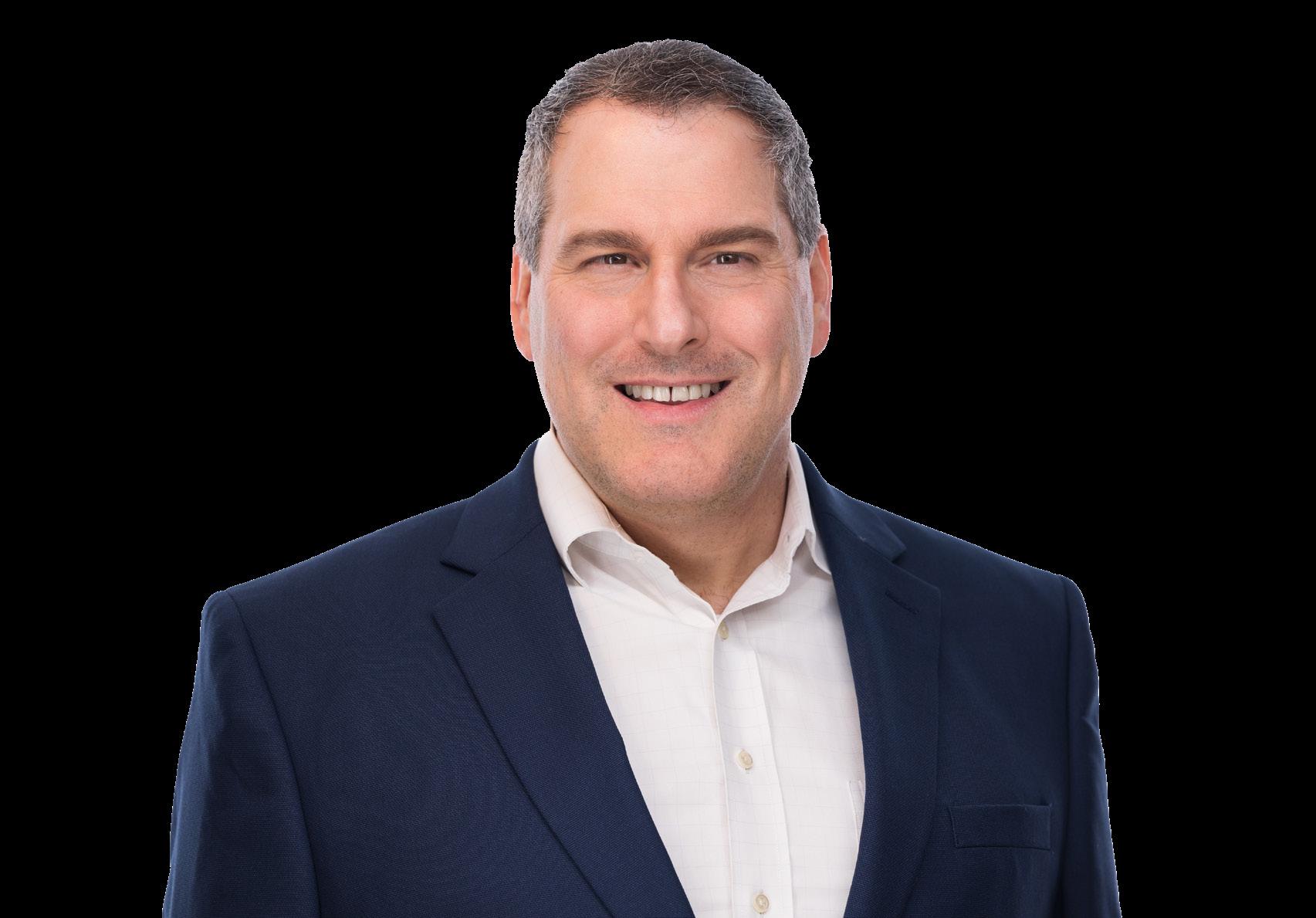
scaled up quickly. For this ACR partnered with ProgrammersIO (PIO), which provides high quality global development resources. “PIO provided us very technically sound resources to support the S2K platform. The level of commitment and quality of their work is outstanding. They are a key part of our IT team,” says DeSandre.
With this foundation established, ACR could set its sights on future projects. Since the transformation got underway, ACR has worked on three major projects: Unity – its ongoing integration project; Spotlight –which focuses on commercial optimisation; and Rubik – its Supply Chain continuous improvement initiative.
As Barnello explains, Project Rubik is part of ACR’s transformative initiative around its supply chain and back-end operations.
“Rubik started with network design and optimisation as well as inventory management, and how we could become more efficient coming out of the pandemic,” he describes. “We had higher inventory levels, low service rates, and we had high back orders as well as splits, in terms of a customer receiving something from a different location on the same order and not at the same time – which was causing customer pain and complexity.”
As part of the strategy, ACR worked with its partners to develop a sustainable roadmap. “We put together a large crossfunctional team that involved IT, Sales, Finance, and Operations and then executed that plan.”
As Barnello describes, ACR has worked with partners across its supply chain, including

Understanding your environment to provide superior protection.

Ontinue Chief Product Officer Tom Corn discusses how the company leverages AI in managed detection and response to deliver a distinctive solution



Driven to define the next evolution of Managed Detection and Response (MDR) for its partners all around the world, Ontinue ION AI-Powered MXDR expertly blends the best of managed extended detection and response — as well as assessment and prevention — into a service specifically designed for Microsoft security customers.
“We specialise in customers who are leveraging a lot of Microsoft security technology,” comments Tom Corn, Ontinue’s Chief Product Officer. “We have a unique process that isn’t just about reactive detection and response, but about constantly improving companies’ security posture, in what we call a proactive reactive service.”
When outsourcing security to MDR players, understanding the client’s control stack poses challenges. While MDR providers may offer expert security support around the clock, the crucial factor is their comprehension of the client’s unique environment. To go beyond basic alerts, effective investigation and response necessitate a deep
understanding of the company’s assets, architecture, and operational constraints.
As Corn explains, Ontinue was started by a group of data scientists with the idea of applying AI to MDR in a unique way. “We are doing something quite different here, where we’re applying AI to understanding the customer and the environment we’re defending, their operational constraints, and how the defenders have to work in their environment. This allows us to solve that problem of how to understand the environment quickly, deeply, and then localise the solution for a customer.”
Ontinue has also innovated with its interaction model. “We started with the premise that the world doesn’t need another management console,” say Corn. “Instead, Ontinue built its interface into Microsoft Teams, so customers and Ontinue defenders collaborate in a shared channel, taking advantage of Teams capabilities they’re already using during the workday. By doing this, we look, feel and act like a true extension of our customers’ teams.
“We’ve specialised more deeply in customers who are using the Microsoft security stack. This has allowed us to do very deep things that you just don’t see from other places because we’ve really specialised.”
GAINSystems is ACR’s planning partner that it utilises for supply and demand planning efforts, he explains, in a partnership over a number of years.
“Not only are they being used for our planning software and all of the inventory and operating policies that go along with that, but they’re also moving into network design as well,” Barnello comments.

“We are seeing tremendous value in a single partner that has both the planning capability and the operating policies as well as the ability to help us design and run simulations and optimisation.”
3GTMS, meanwhile, has provided ACR with visibility across its transportation network. “What they’ve really done is given us the visibility and the data to be able to effectively manage our outbound freight and understand where we’re winning and losing and then really to chase that down,” Barnello adds.
When it came to looking at ACR’s data strategy, DeSandre emphasises the importance of a clean stream of master data which can be easily accessed in near-real time. This is where ACR’s partnership with global process mining technology leader Celonis came into play.
“Our work with Celonis really is at the heart of our data strategy, to the point now that we’re really moving towards having all of our data in one place within Celonis. Today, we’re just starting to tap that potential and I think the executive team is just starting to really understand the power of having that data model.”

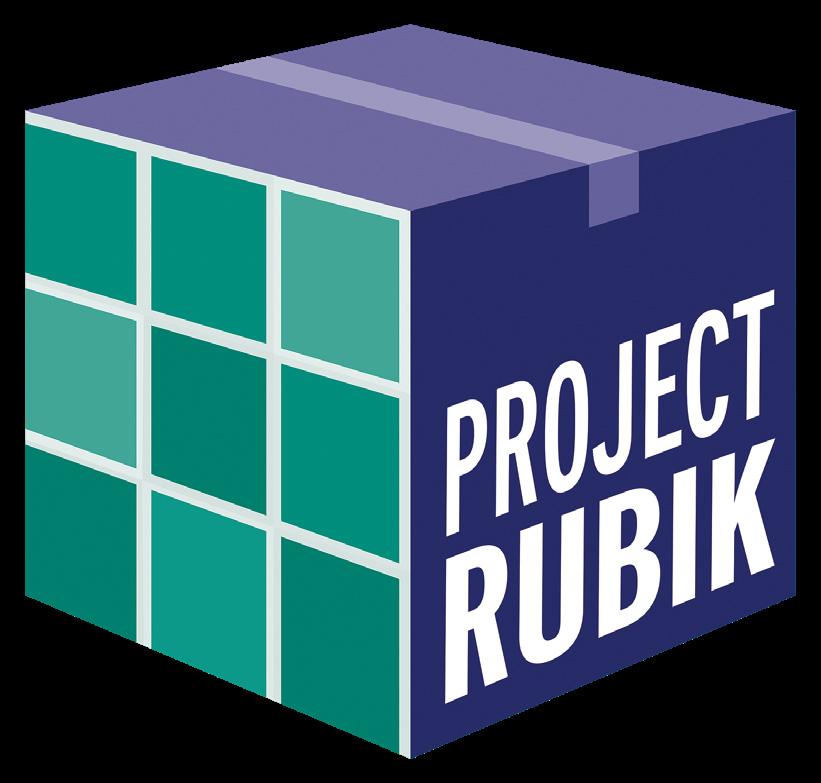

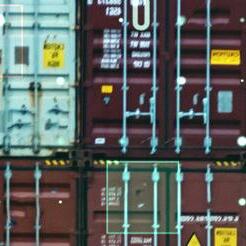


Drive faster, smarter decision making everywhere inventory matters. GAINS helps businesses move forward faster with greater agility, resilience, and confidence, even in disruptive times. The GAINS AI-driven cloud platform guides supply chain decision makers to the outcomes that optimally balance the tradeoffs between freeing working capital, lowering operating costs, and meeting service goals for global manufacturing, distribution, retail and aftermarket/maintenance companies.

As a leader in supply chain design and planning, GAINS focuses on putting its customers first and moving them forward faster. Jeff Metersky, the VP of Solution Strategy at GAINS, guides and directs the overall strategy of the GAINS supply chain solution.


With decades of experience providing supply chain solutions and services, Metersky knows that traditional supply chain design and planning strategies no longer fit volatile business environments. They lack the flexibility to plan for disruptions and continuously optimise inventory.
“Supply chains are no longer predictable and stable. They have become fragile and exposed due to increased variability and the rise in global disruptions,” Metersky says. “Businesses can no longer rely on the same techniques because our environment has changed – the focus cannot be on cost alone. Today’s decisions need to balance the trade-off between cost and service to mitigate risk and drive performance.”
“Using GAINS’ solutions, companies will be able to navigate uncertainty in their supply


chains, enabling much greater adoption of designs instead of making them academic exercises. Designs will become more pragmatic so that companies can fully understand their impact and increase the likelihood of adoption.”
Partnering with AmerCareRoyal to enhance supply chain decision making
GAINS has been on a journey with AmerCareRoyal (ACR) to automate and transform its operations. Consequently, ACR has grown rapidly – doubling in size – as they continue to acquire new businesses.
“Due to their partnership with GAINS, ACR has achieved rapid results, optimised inventory across their network, managed volatility, and become more resilient by being open to continuous improvement and looking for new ways to improve performance,” Metersky states. “This strategy achieves their desired outcomes and provides a scalable foundation on which they can embrace volatility and serve their customers well”.
Jeff Metersky, GAINS’ VP of Solution Strategy, explores how better supply chain decisions are moving AmerCareRoyal forward
From procurement optimization to sales automation and warehouse management, VAI’s ERP applications help wholesale distributors, like AmerCareRoyal, improve customer service and boost productivity.

VAI provides you with an ERP without limits by integrating business processes across your organization.

An example of this success comes through ACR’s work with Emporix and Avatria on implementing a new Digital Commerce Platform, which enables its customers to utilise insights and ultimately deliver better outcomes. The product is known as the 1ACR portal.
“We just went live with our new portal, and I’m happy to say that we don’t have a point-to-point interface. Any information that we already know is clean, and is in Celonis, is being syndicated to our portal, which makes us very unique. We really are starting to get to a point where

our transactional data is able to be syndicated and used in these different systems.”
As DeSandre explains, the ultimate goal is to achieve a single version of the truth with a low amount of manipulation.
“There are still some shortcomings with not all required data being tracked in our master data as part of our ERP,” he adds. “To correct for this and enable change as ACR continues its evolution we have amended our ERP to support non-native master data allowing our ERP to serve as a system of record where necessary.”
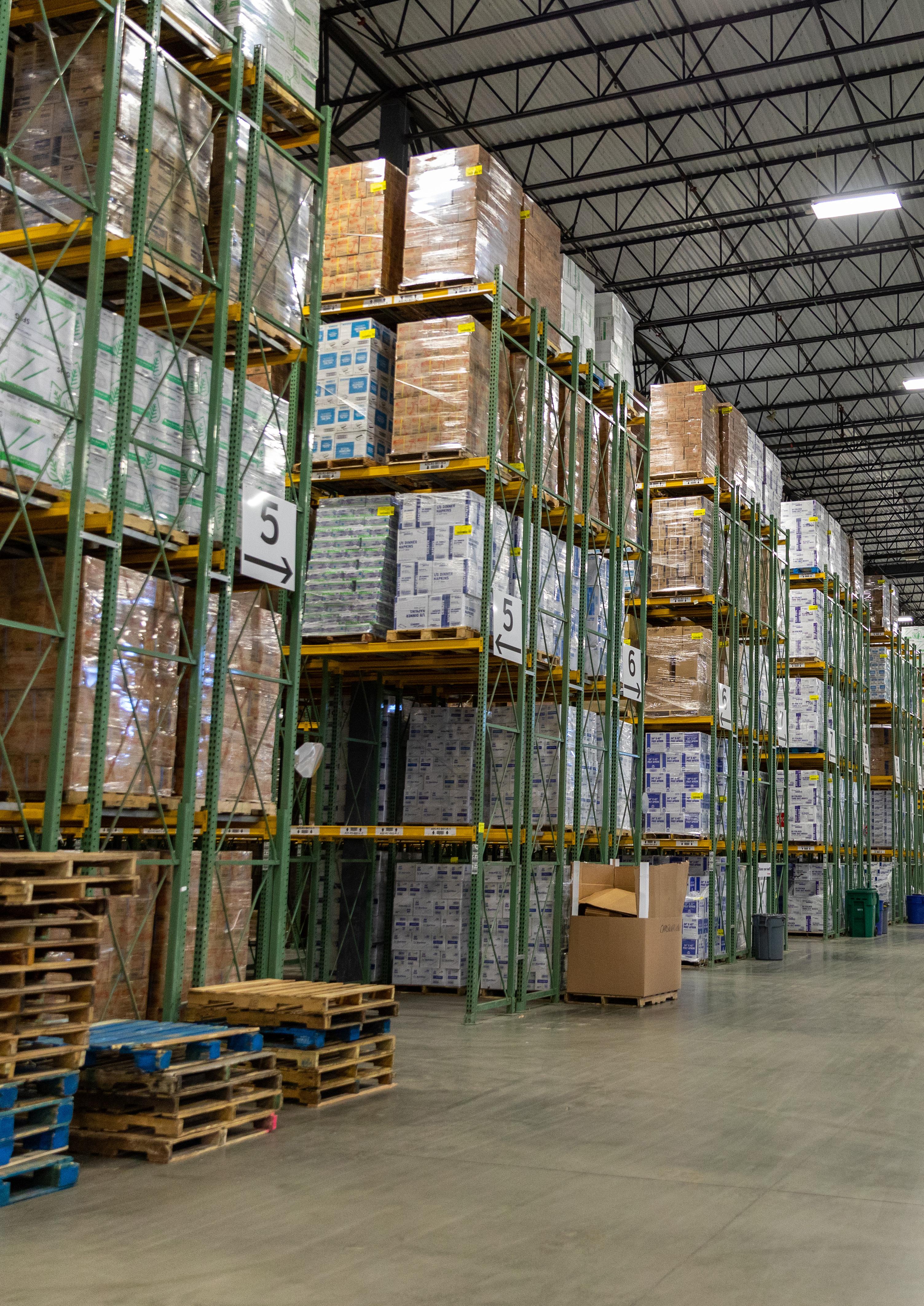

For ACR, which continues to grow through acquisitions, the message for the future is one of continued partnership. And through its projects – Unity, Rubik and Spotlight –the transformation will continue to evolve.
“I don’t think it stops,” Barnello comments. “This is really a jumping off point for us. We’ll continue to refresh the network as we continue to acquire new businesses, new geographies and new customers. We’re turning to using data and the digital transformation on our spend cube and in our procurement space as well.”
As DeSandre concludes, the future will see ACR continue to drive innovation across its ongoing transformation projects.
“I really do feel like we’re at a point of almost best of breed in our supply chain capability. But on our commercial processes, our pricing strategy, how we process rebates, bill backs, how we deal with the commercial aspects of our customers, I do think that we’re probably still about a year or two away from being a best of breed there. So I think that’s going to be a lot of our focus.
“We have really strong leadership now, and so the future for me is really about continuing the great work that we’ve been doing for the last three years,” he concludes. “It’s going to be about pulling it all together and continuing driving our supply chain optimisation projects in Rubik as well as our commercial optimisation projects in Spotlight.”
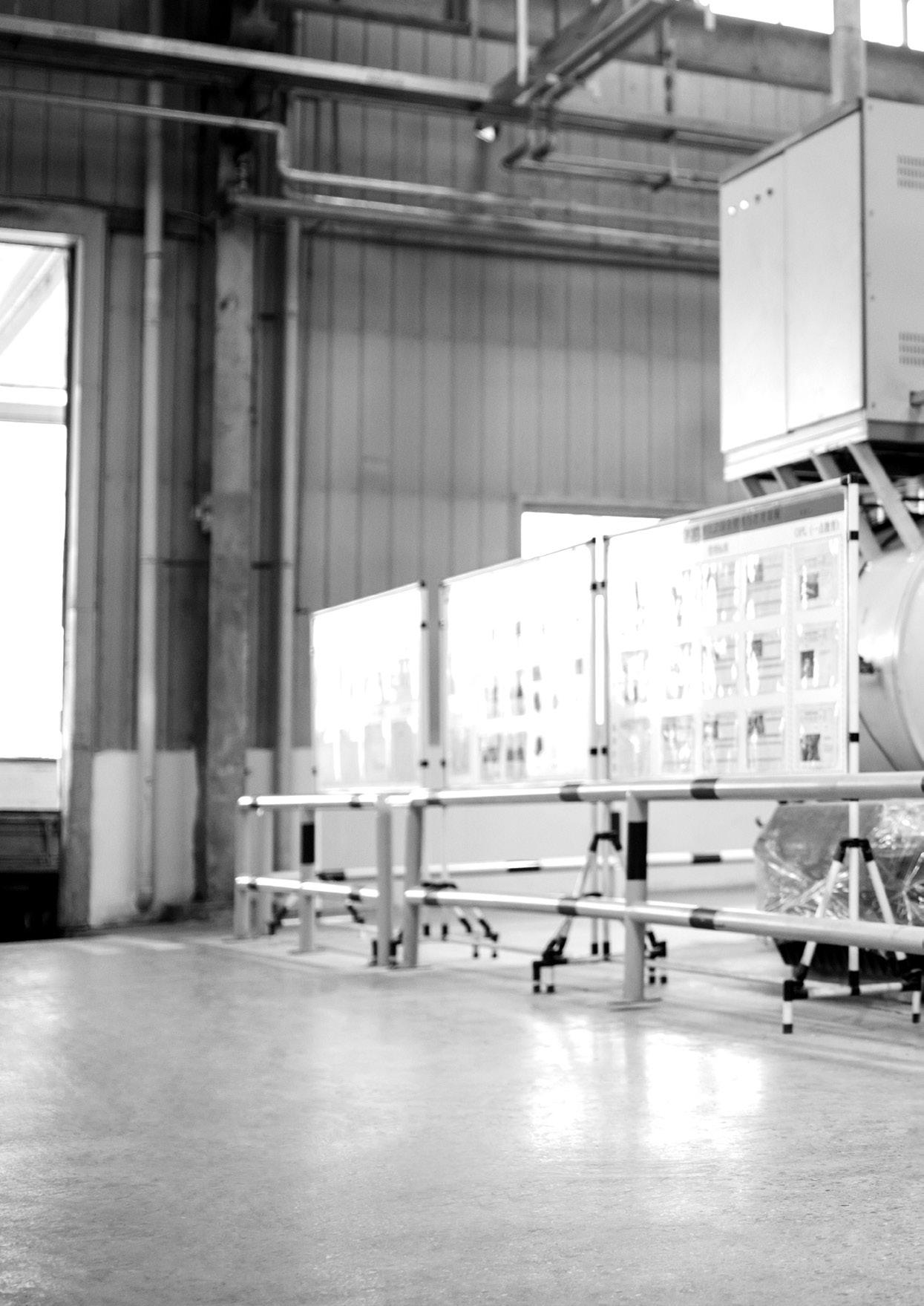
It is hyper-connectivity with suppliers that brings resilience to supply chains, rather than super-lean, super-fast operations
WRITTEN BY: SEAN ASHCROFT

“When a business is looking to improve its performance, suppliers are often overlooked compared to other key stakeholders”
RICHARD HOGG, CEO, VIZIBL
Strong supplier relations are forged by the management of frontline operations, contracts performance and risk. Put like this, It sounds simple, but in reality requires businesses to know their supply chain inside out.
In old money such knowledge might be called having an ‘in-the-round’ view of supply chain. Today, it’s more likely to be dubbed ‘hyper-visibility’, a 360-degree view or end-to-end visibility.
The naming conventions might have changed, but the prerequisites for healthy supplier relations have not. The clue is in the title: it’s all about relationships.
And like all relationships, it’s a two-way street. Suppliers want to build strong relations because this is what gives them preferred supplier status. Organisations want the same thing, because such relationships help add value outside of supplier contracts, and when scaled-up these benefits bring resilience.
Richard Hogg is CEO of Vizibl, a collaboration and innovation platform, that helps both buyers and suppliers manage their relationship. Hogg says strong supplier engagement is a way to improve supply chain resilience and sustainability.

“When a business is looking to improve its performance, suppliers are often overlooked compared to other key stakeholders like shareholders and customers,” he says. “This view is not only misjudged, but it’s also a wasted opportunity.”
He says supplier engagement can cover a broad set of actions, activities and tactics to deepen relations, but feels the best results come from “higher-intensity tactics”, which include supplier collaboration and innovation.
Knowing where to start can often be the most difficult thing, says Hogg.
One logical place he says is for businesses to not only have clear strategic aims as a
TITLE: CEO
COMPANY: VIZIBL
INDUSTRY: SUPPLY CHAIN
Former JAGGAER executive Hogg joined as Vizible’s new CEO six months ago. He says of himself: “I specialise in B2B SaaS GTM planning, marketing, customer acquisition, sales cycle processes, expansion, successful implementation, adoption and retention focus with full sales bookings and P&L responsibility.”
Streamline purchasing while saving on everyday supplies so you can focus on growing your business.
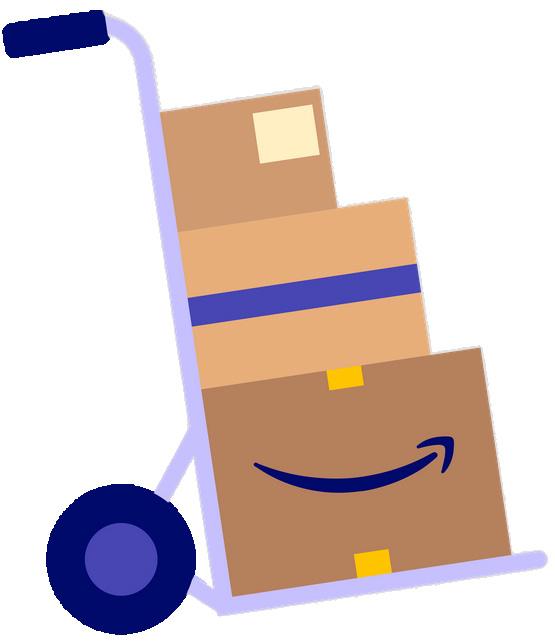
Create

business but to share these with suppliers.
“These should include the metrics you need to meet in order to be a success, and how your procurement strategy and tactics fit into that broader goal,” he says.
He adds: “Strategy sharing should address short-, medium-, and long- term plans, and include a sense of the pains your business is responding to.”
This he says gives suppliers an idea of how they can strengthen their relationship with an organisation based on its priorities, meaning they are better able to meet and understand its needs.
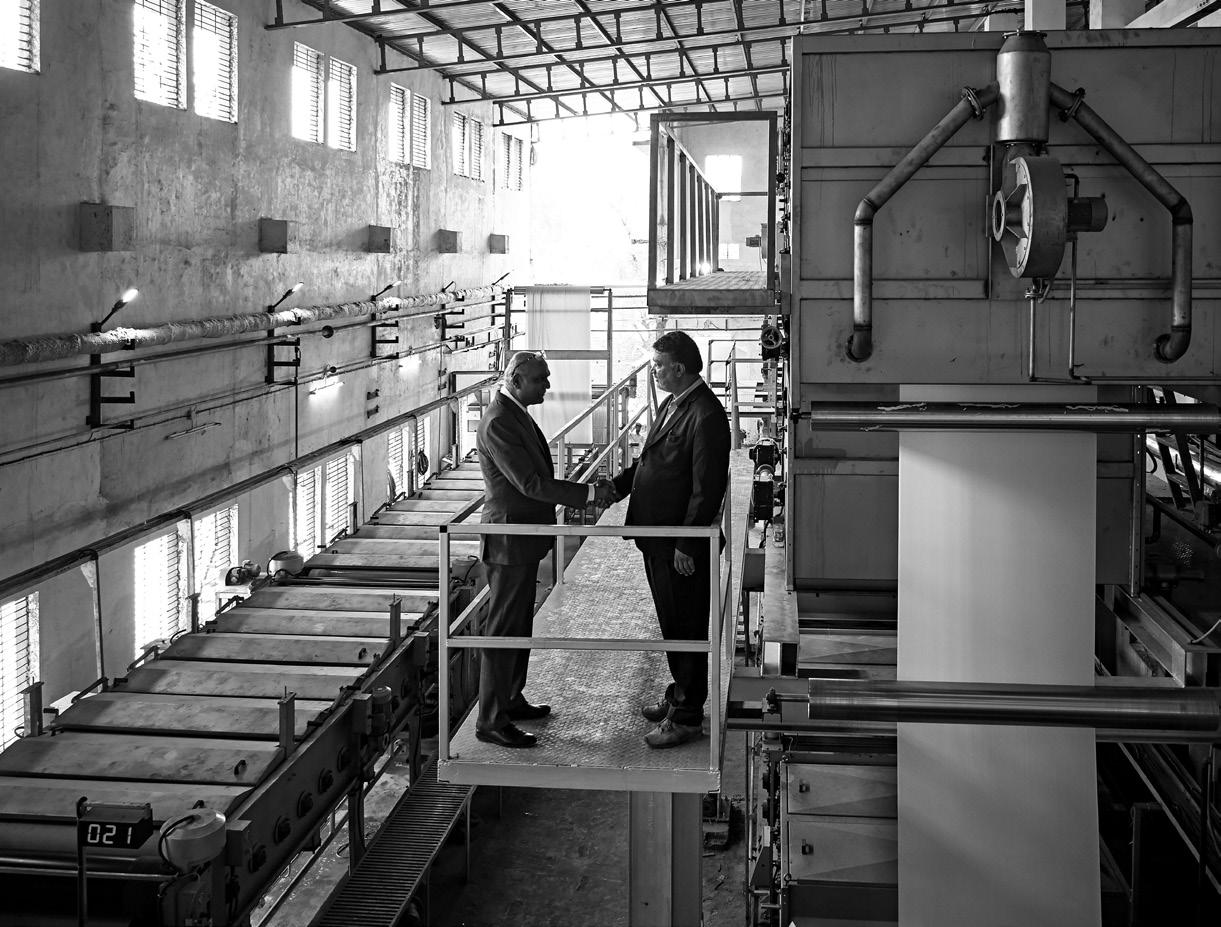
“This should also be reciprocal,” Hogg advises. “Suppliers should be invited to share strategic plans for their own businesses, as this facilitates joint opportunities for mutual growth and development early on in the relationship.”
Data collection is another crucial aspect of strong supplier relations, Hogg says.
“This allows you to identify areas for improvement or opportunities for growth, in addition to laying the groundwork to prove the value of other engagement tactics.”
He says this data should include indicators of performance, risk, and opportunity, across areas such as spending, quality, sustainability, resilience and innovation.
“How you collect these will vary,” he says. “When it comes to spending, quality, and operational performance it’s likely to be a case of enriching the data you already have on a given supplier.”
By contrast, he says for sustainability, the data-gathering process is likely to be more involved.
“Turning to disclosure platforms is a great way to ease this friction,” says Hogg.
By way of example, Hogg says businesses can ask suppliers to disclose to CDP, the not-for-profit body that runs the global disclosure system for investors, companies, cities, states and regions to manage their environmental performance.
But what if there is a mismatch between an organisation’s strategies and those of a supplier?
“It’s important to remember that some targets can undermine your relationship with suppliers if they do not yet have the capacity or knowledge within their business to understand or meet them,” warns Hogg. “Begin with manageable, leading indicator
targets. Regardless of your use case, it’s important for suppliers to feel reassured they’ll receive support to achieve them.”
In short, Hogg says it’s best to “aim high but start small”, with a view to scaling successes.
Another expert in the field of supplier relationships is Andreas Baader, who is SVP Supply Chain Serviceline, Germany, with US professional services firm, Genpact.
Baader feels that some organisations can become too focused on supply chain performance levels, and that such a ‘need for speed’ approach can be to the detriment of supplier relations.


TITLE: SVP SUPPLY CHAIN SERVICELINE, GERMANY
COMPANY: GENPACT
INDUSTRY: PROFESSIONAL SERVICES
Genpact for four years, and is based in Munich. Prior to this he was Managing Partner with Barkawi Management Consultants, a Genpact company.

“Hyper-connectivity with suppliers, rather than lightning-fast speed, should be the ultimate measure of a successful supply chain”
ANDREAS BAADER, SVP SUPPLY CHAIN SERVICELINE, GERMANY, GENPACT


Best practice supply chain strategies –including those to boost supplier relations – is overseen by the Institute for Supply Management.
The ISM is the oldest not-for-profit supply management organisation worldwide.
Founded in 1915 it is committed to advancing supply management to drive value and competitive advantage for its 50,000 members. It publishes professional guides, including the ISM Report On Business, and also runs highly-regarded certification and training programs, corporate services and events.
It also offers advocacy and thought leadership around supply management, and lobbies on issues that affect its members at national and international levels.
“We work to promote the value of supply chain management and contribute to policy discussions on issues affecting the profession,” it says.
According to PwC research, almost a quarter (23%) of businesses do not have an SRM programme
“Lightning-fast speeds should not be the ultimate measure of a successful supply chain,” he says. “Rather, the target should be hyper-connectivity with suppliers, and the inherent resilience that comes with this.”
Baader adds: “While the global supply chain continues to struggle with new demand patterns, looming recession, and geopolitical tensions, there still lies a sense of urgency to bolster production and return to the status quo, which in some minds, equals speed.
To counter this, Baader says businesses must begin to accept that “the supply chain does not need to be lightning fast to succeed”.

He adds; “Companies should instead focus on creating a hyper-connected supply chain that through successful supplier
relationships, planning, and data, tech and AI reduces their supply chain footprint and builds onto existing capabilities – essentially concentrating on reliability and resilience.”
Supply chains should allow sales to match customer demand and constraint supply, Badder points out, adding: “To do this organisations can embed agility into all aspects of the supply chain using digital enablers such as IoT, data analytics, and advanced control towers.”
These tools, he says, “will improve insights and help streamline processes, from sourcing to demand”. He adds: “Speed will come for free through reliability, and the use of technology, data, and AI will create sustainable, nimble, and hyper-connected supply chains that are prepared to serve the next generation of consumers.”


6 - 7 December 2023
1,000+ Virtual Attendees
2 Day Learning and Networking Event
30+ Acclaimed Speakers
6 Interactive Panel Discussions


The Manufacturing stage is here, and it’s putting on an exclusive 2-day virtual event for the industry.
Join Manufacturing Digital LIVE on 6 and 7 December for a two-day virtual event, where the brightest minds in Manufacturing will grace the stage.
Experience a unique opportunity for knowledge sharing, learning, and networking with industry professionals from all corners of the globe.
Dive into the innovative networking platform, Brella, to build meaningful connections, schedule meetings, and prepare yourself for the immersive LIVE stream about to unfold.

There are more than 30 internationally acclaimed leaders that you can’t afford to miss!
Covering five key themes, the event will showcase engaging presentations, interactive sessions, panel discussions and fireside chats, facilitating deep learning and exploration: Factory of the Future, Sustainability, Digital Manufacturing, Tech & AI and Women in Manufacturing.
Mark your calendars, set your reminders, and get your complimentary pass to Manufacturing Digital LIVE!
It’s time to connect with like-minded professionals who share your passion for innovation and growth.
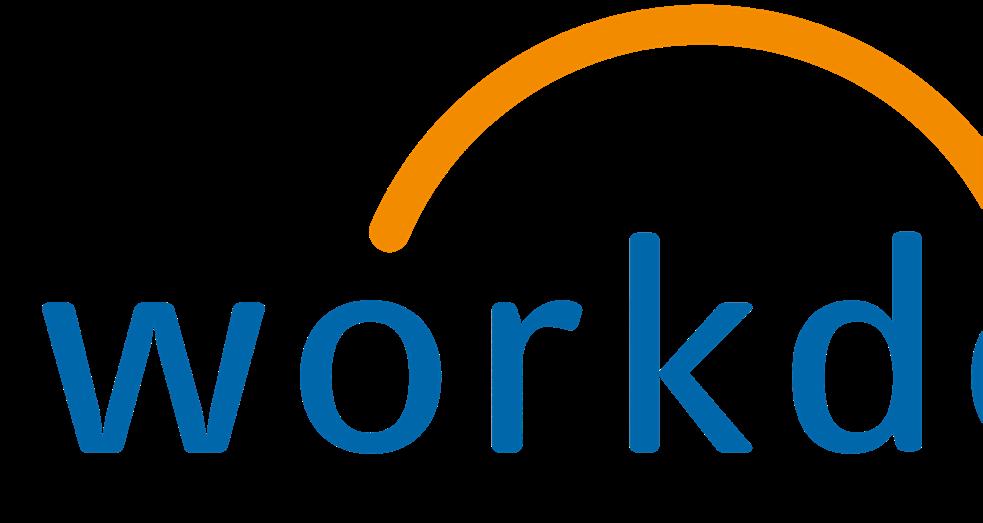
 WRITTEN BY: NEIL PERRY
PRODUCED BY: JAMES WHITE
WRITTEN BY: NEIL PERRY
PRODUCED BY: JAMES WHITE


With some businesses operating with multiple ERP, procurement, merchandising or warehouse systems that may not communicate intelligently with each other, it can create a complex set of problems that lead to wasted time, money and effort.

When financial management experts Workday and software solutions specialists Hyland first began working together in 2015, with different perspectives on such problems, it created an opportunity for a solution that can join disparate systems together and solve a wide range of issues. They set in motion a partnership that would result in the development of the Hyland Direct Spend Matching for Workday solution that provides any organisation that pays direct spend invoices with more efficiency, accuracy and visibility.
With different experts coming together, it was a collaboration primed to offer this product that would maximise the strengths of each other.
“The solution that Hyland offers is called Hyland Direct Spend Matching for Workday,” says Danielle Simer, Product Manager at Hyland, whose background began in the marketing space, before transitioning into product management. “Hyland is acting as an intermediary or a bridge between your Workday ERP and your front-end procurement system.

TITLE: PRODUCT MANAGEMENT LEADER

COMPANY: HYLAND
As a member of Hyland’s product management team, Don Dittmar is setting the vision and direction for products and solutions specific to all of Hyland’s Vertical Solutions. His domain expertise in business process automation helps Hyland discover, build, and deliver solutions that enable customer automation and innovation throughout their business processes. Prior to joining Hyland in 2019, Dittmar has held leadership roles in Finance, HR, and Shared Services in a number of industries, and is a 3-time customer of various Hyland Solutions.


TITLE: SENIOR DIRECTOR, INDUSTRY STRATEGY
COMPANY: WORKDAY
Sharon Schell is the senior director of industry strategy at Workday, responsible for the product direction and strategy for the retail, consumer goods and hospitality industries. Sharon has been at Workday for five years and has more than 30+ years of retail industry management and software product strategy experience. As an advocate for change and improvement within retail. consumer goods and hospitality industries, Schell collaborates with our customers and partners to continuously innovate and evolve our solution portfolio to meet their current and future business needs.
TITLE: PRODUCT MANAGER
COMPANY: HYLAND
Danielle Simer is a product manager focused on managing the life cycles of Hyland’s financial process automation solutions, including major ERP integrations. She joined Hyland in 2015 and spent her first six years as a portfolio and product marketing manager covering Hyland’s Cross-Industry vertical and Capture products. Prior to Hyland, Simer was a marketing manager at the business research and advisory firm CEB (now Gartner). She received her bachelor’s degree from The Ohio State University and her MBA from Georgetown University’s McDonough School of Business.

So, we’ve developed this with companies in mind who are generating purchase orders in a procurement system or some sort of thirdparty system that is not Workday, but they want to pay their vendors through Workday.”
Sharon Schell is the Senior Director of Industry Strategy at Workday for Retail, Consumer Goods and Hospitality. She brings with her three decades of management and strategy experience from the retail and software industries, collaborating with Workday’s customers and their partner ecosystem to solve for key business challenges in the industries.
“Companies with inefficient AP processes often lose opportunities to take advantage of early payment discounts,” explains Schell, as she digs into her first-hand experience in retail. “So not leaving discounts on the table, controlling costs and finding cost efficiencies
wherever we can are critical nowadays. Companies with these inefficient processes often lose opportunities to take advantage of these, adversely impacting, again, their cashflow and then obviously contributions to bottom line and overall margin.”
It is the broad range of business experience in the two teams that helps the product deliver to the differing needs of clients and has helped to inject real-world reality into the product.
Don Dittmar is the Director of Industry and Product Strategy for Hyland Software, and his role takes in the strategic direction and roadmapping for all their industry solutions.
He began his career in finance, before moving into finance technology and then into the realm of product management.
Dittmar is excited to see the evolution in
content automation – from being an application to more of a service – over the last 20 years.

“The really exciting part about what we have with our partnership with Workday is that there’s no more bounce rate for our customers,” he said. “They aren’t working in one application, going to another, and coming back. We’re starting to share screen space to share a user experience where the content services that Hyland provides is less and less visible.”
It’s these kinds of seamless solutions that excite the whole partnership, as it allows the realisation of benefits like performing threeway matches, to check if the order matches what was invoiced for and if it matches what was received. There are also other cashflow management solutions, such as an approval reporting feature that identifies received items that have not yet been invoiced.
“All of these benefits, from general AP automation and then this combined solution, really go a long way in terms of paying vendors on time, managing cashflow, keeping your CFO happy and getting rid of a lot of just extra paper that is floating around your office,” Simer said.
Alongside the opportunities to optimise processes, Simer highlights the evolution of the last decade, with increased use of the cloud and the value of the data that’s produced. It’s these enhanced reporting capabilities that she finds interesting, as accounts payable data can be utilised to support the goals of the finance operation.
The well-established links between the two companies has allowed rapid development of new solutions, thanks to the trust built up
from years of collaboration. After signing as official partners in 2015, Hyland and Workday launched their first joint venture in 2017.
“Hyland has been in business since 1991, and we’ve helped thousands of customers automate their accounts payable processes. To be successful in this area, ERP integrations are key. We launched the initial version of AP automation for Workday in early 2017, and it’s been one of our highest-growth products, which is a true testament to our partnership,” Hyland’s Dittmar said.
Workday saw Hyland as a key solution that complimented Workday’s financial management capabilities by capturing and managing critical invoice details alongside customer AP records. The collaboration would then speed up processing and approval processes and increase visibility throughout the transaction.
“We really saw this as a win-win for our customers – two best in class solutions delivering differentiated value for our co-customers,” said Schell from Workday.

DON DITTMAR PRODUCT MANAGEMENT LEADER, HYLAND
“What Hyland and Workday have really established is not only that go-tomarket motion partnership, but a product-to-product alliance as well”
10,000 Organisations use Workday worldwide
14,000 Active customers at Hyland
The partners were able to jointly develop the solution and build out and solve the integration challenge, which was helped through the seven years of experience jointly developing integration points with both platforms. By working together at every stage, the quality of the data moving between the systems has been maintained.
“There are a lot of partnerships in the software industry ecosystem that are what I’ll call sales or alliance partnerships,” Dittmar said. “Those are great, and they form a good foundation, but what Hyland and Workday have really established is not only that go-to-market motion partnership, but a product-to-product alliance as well.”

DANIELLE SIMER PRODUCT MANAGER, HYLAND
“If our solution can make someone’s day-to-day job easier and it’s easy to follow, it’s easy to answer questions and just makes their life easier, that’s what it’s about for me”
The depth of the collaboration is obvious, as both companies know that there is a level of trust to help each succeed long after initially going to market.
“We have a trust level where I know that if Schell’s organisation (Workday) is working with a particular customer, they are representing us, and vice versa, that we’re representing Workday as a complete offer to that customer,” Dittmar said. “So having that product-to-product connection is really critical for us and for the customer.”
The challenge facing growing businesses Growing businesses creating an increasingly large system footprint and disparate systems
not communicating properly with each other creates what Schell from Workday describes simply as a “big data challenge.” It’s the type of problem that the two parties were looking to ultimately solve for their customers, whether it’s instances of multiple ERPs, procurement, merchandising or warehouse systems.
“We conduct system architecture workshops where we’re looking at a retailer’s system footprint,” Schell said. “Each company typically find ourselves solving for this interoperability and the issues resulting from that interplay between the systems, and this solution makes it more seamless for the end user.”


When businesses grow and expand, invoice volume increases, as do all the associated challenges of managing that volume. There are expensive options like adding staff and complicated logistical problems like adding systems, which can increase the layers of complexity.
“When you get down to the processlevel challenges that we see, our customers really do struggle in AP with manual data entry,” Simer said. “You would think it was something so simple and easy to solve, but it really is a problem. If you have an invoice with multiple lines, multiple line items that need codes and to be matched against the purchase orders and entered into the ERP, that’s a significant amount of work just for one sheet of paper. That’s assuming that the invoice is one sheet. It’s a small thing, but it really, really adds up.”
Manually entering this kind of information can lead to errors finding their way into the ERP, and when those errors are identified, it adds extra layers of steps and corrections to get invoices paid. Simer adds that if you process tens to hundreds of thousands of invoices a month, these types of manual issues can add up, which emphasises the importance of having accounts payable automation systems to improve efficiency and accuracy.
With so many disparate systems in use, especially in retail and hospitality sectors, it’s essential that any solution like the options presented by Hyland and Workday is flexible and adaptable.
Dittmar believes that’s an area where Hyland’s product platform really excels.
“It’s extremely complex but can be managed through a set of logical rules,” he said. “That allows enough flexibility from customer to customer or even retail system to retail system. Workday at one end is very fixed, but at the other end, there are multiple retail systems and, in some cases, even the same customer may have more than one retail system that they’re using to generate different types of purchases.”
He said it’s essentially taking the way that the retail buyer wants to work, and the way the finance operation needs to record the transaction, and building a translation layer in between the different systems.
“Connecting those systems and reducing that friction from a data standpoint, from a technology standpoint, from a business process standpoint, from a stakeholder’s visibility and insight to action on all of these pieces as well,” Schell added.
The two companies expect their collaboration to produce continuous improvement and innovation.

“We are continuously evolving the product. Everyone is on the same version of Workday,” Schell said. “With this partnership with Hyland, we’re in sync all along due to this single version. We can innovate together, so as we deliver additional functionality in our financial solution that complements their portfolio, and we can collaborate directly with them accordingly.”
It’s the complementary relationship between the partners that’s one of the greatest strengths of the end product, Dittmar said. He recalled a customer who praised the single user experience that helped them make a decision on both parties, which ultimately increases the pipelines of both companies.
“I think the really big differentiator is where we make it seamless to that end user that we are interoperating with and providing them a differentiated experience between two best-in-class solution providers and really helping them solve for a very complicated issue in a very streamlined, interactive, seamless way between the two solutions,” Schell added.
With the varied experiences brought to the development table by the companies, there’s genuine pride in knowing the results of the platform for the end users.
“Having lived on the customer side, it’s exciting and it’s rewarding for me in that I’ve lived that problem. I’ve lived the workarounds, I’ve lived the late nights when you’re reconciling an inventory or something at the end of a quarter,” Dittmar said. “Knowing not only the value we’ve created, but also what we’ve prevented, the headaches and the long nights, that it is rewarding to me.”
Schell from Workday shares that feeling, having the experience from the perspective of the end user.
“As we do at Workday, we’re going to leverage the most modern technology, whether it’s AI and machine learning, and how we are bringing that intelligent automation to the process,” she said. “We’re bringing that visibility and making sure that we are making this process more efficient, and then freeing up time to have more value-add to be able to actually analyse the business and really make some of those critical decisions and adapt to the business and respond accordingly.”
The power of the partnership between Hyland and Workday ultimately comes down to the experience of the end user and solving the problems they may have had before implementing the solution.

“If our solution can make someone’s day-to-day job easier and it’s easy to follow, it’s easy to answer questions and just makes their life easier, that’s what it’s about for me,” Hyland’s Simer said. “That is what I am most proud of is relieving someone’s headache who is going to be in the system every day.”

SHARON SCHELL SENIOR DIRECTOR, INDUSTRY STRATEGY WORKDAY
“We can innovate together, so as we deliver additional functionality in our financial solution that complements their portfolio, we can collaborate directly with them accordingly”
HYLAND

Latin America is seeing an e-commerce boom but poor service levels are eroding trust and harming progress.
Fulfilment specialist Melonn is beginning to change all this
WRITTEN BY: SEAN ASHCROFT

ith so many moving parts that are vulnerable to disruption of all kinds –road traffic accidents, extreme weather and industrial action, for example – last-mile logistics has always been the most expensive and problematic part of supply chain.
But following the meteoric rise of ecommerce during the pandemic, the e-commerce boom is now asking more questions than ever of last mile, with sameday and next-day deliveries becoming the norm, rather than a bonus.
Such fulfilment strategies are hugely challenging to deliver, but this is now what modern retail logistics is all about. Which is fine, if your customers have inherent trust in your ability to come through on this promise, day after day, like clockwork. But what happens when that trust breaks down – or if it isn’t even there in the first place?
This vacuum of trust is exactly the situation that faced Melonn when it launched a few years ago, Melon is a logistics and ecommerce software solution provider that helps suppliers in Latin America (Latam) ship products on the same day across multiple locations.
“We’re building the real, tangible half of e-commerce,” says Melonn Co-founder Andrés Felipe Archila. “We like to think of it as the missing half of Shopify.”
Using Melonn’s backend technology platform and its end-to-end fulfilment solution, e-commerce business in Latam can scale across sales platforms as well as cities and countries, delivering orders on the same or next day,” says Archila.
But the challenge Melonn faces is one that most last-mile logistics operations in North America and Europe do not encounter: a lack of trust. Many shoppers in Latam have little faith that packages will arrive on time, or at all.
Similarly, local sellers worry about receiving payments, which are often not made until after delivery.
So the challenge for Archila and his colleagues is not only to actually deliver on time but to ease customer and seller concern by providing end to end transparency.
“There’s not the same level of trust in e-commerce in Latin America as in the US or Europe”
ANDRÉS FELIPE ARCHILA, CO-FOUNDER, MELONN
Gain visibility into rebate program performance
Easily calculate, pay, accrue and forecast your rebates
Grow stronger trading relationships
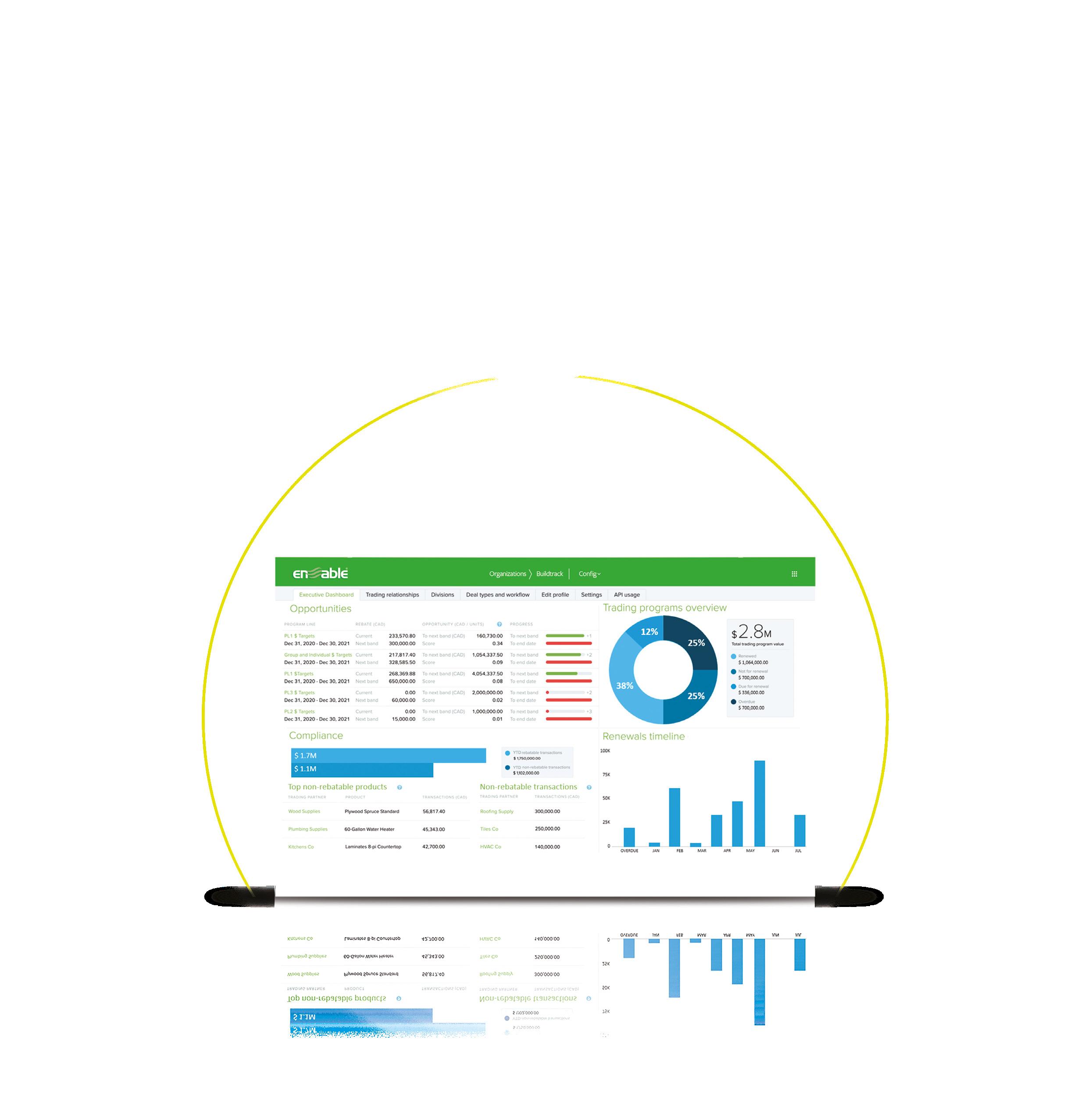
B2C ecommerce 'hard' in Latin America
In an interview with Accenture, Archila says: “We’re a third-party logistics partner for B2C e-commerce but doing that in Latin America is really, really hard.

“There’s not the same level of trust in e-commerce in Latin America that you have in the United States or Europe. In Latin America, if you buy something through an e-commerce channel, the first things you ask are, ‘Will it get here on time?’, or ‘Will it get here at all?’
“Without trust that the packages will get there, and payments will be reliable, the system breaks down. This is the main barrier to e-commerce in Latin America.”
TITLE: CO-FOUNDER
COMPANY: MELONN INDUSTRY: LOGISTICS
Archila is a multilingual, award-winning engineer, with a masters in Transportation from MIT and 10 years of expertise in transportation and logistics. His main interests are entrepreneurship, consulting, education, research and public policy.
Expanding on the trust issue, Archila says the on-time performance of the overall e-commerce industry in Latin America is “not great”.
This, he says, is why Mellon reduces customer anxiety across the whole ecosystem through transparency.
“When you have trusting customers, you have recurring customers, and it becomes a reinforcement cycle,” he says.
Mellon’s trust reinforcement strategies also extend to payment methods.
“Not everybody has a credit card or a debit card, and even if they do, many won’t put their banking information online,” says Archila. “Working with a partner like Melonn
Walmart has opened a vast new 2.2 million-square-foot fulfilment centre near Indianapolis.
The next-generation facility is Walmart’s largest fulfilment centre to date, and will enable the retailer to fulfil more orders, more quickly.
The centre is the second of four next-gen facilities that brings people, technology and machine learning together, to achieve faster shipping and delivery, while increasing Walmart.com order fulfilment capacity.
It is the company’s largest fulfilment centre to-date, and is designed to expand access to the retailer’s nextor two-day shipping.
Combined with the rest of Walmart’s fulfilment network, these centres will allow it to reach 95% of the US.
“Indianapolis marks a major milestone in our supply chain modernisation journey,” says Karisa Sprague, SVP Fulfilment Network Operations for Walmart US. “With more customers shopping online, we’re leveraging state-of-the-art technology to increase speed of delivery all while creating techempowered career opportunities for our associates.”
helps put in place a middleman that everybody trusts.”
Underpinning Melonn’s solution is a technology platform that incorporates all aspects of fulfilment, including management systems for transportation, warehousing and orders.
“We store the inventory of our sellers in our warehouses,” Archila explains, “and when a customer buys online we do the fulfilment – the picking, packing and the shipping.

We make sure it gets there, and we make the process visible to all layers involved with tracking links and alerts.”
Bespoke management systems Mellon developed its own management systems, rather than opting for off-theshelf solutions because, says Archila, “there were important operational capabilities that didn’t exist, plus we knew that to make e-commerce work, there has to be superb

“We like to think of our solution as being the missing half of Shopify”
ANDRÉS FELIPE ARCHILA, CO-FOUNDER, MELONN
integration of systems”. He adds: “If we had a warehouse management system that was isolated from sales channels, there could be miscommunications about inventory, and the order might not be fulfilled.

“If it’s not connected to the transportation providers, we’d lose precious time making deliveries and we couldn’t deliver sameday. So we created our own integrated technology.”
Although Archila says e-commerce has “arrived in Latin America with all its user expectations” he says the industry has not yet reached the same maturity level.
In 2020, retail e-commerce sales in Latin America were around $85bn 35% up on the previous year before the COVID-19 pandemic
“People have gotten used to buying and selling online, and their expectations have gotten loftier and more complex,” he says. “Those expectations are not only about delivery speed and quality but also about transparency and providing a broad range of options.”
“So that’s the gap,” he points out. “And bridging it is what we are striving to do.”

“When you have trusting customers, you have recurring customers. It’s a reinforcement cycle”
ANDRÉS FELIPE ARCHILA, CO-FOUNDER, MELONN
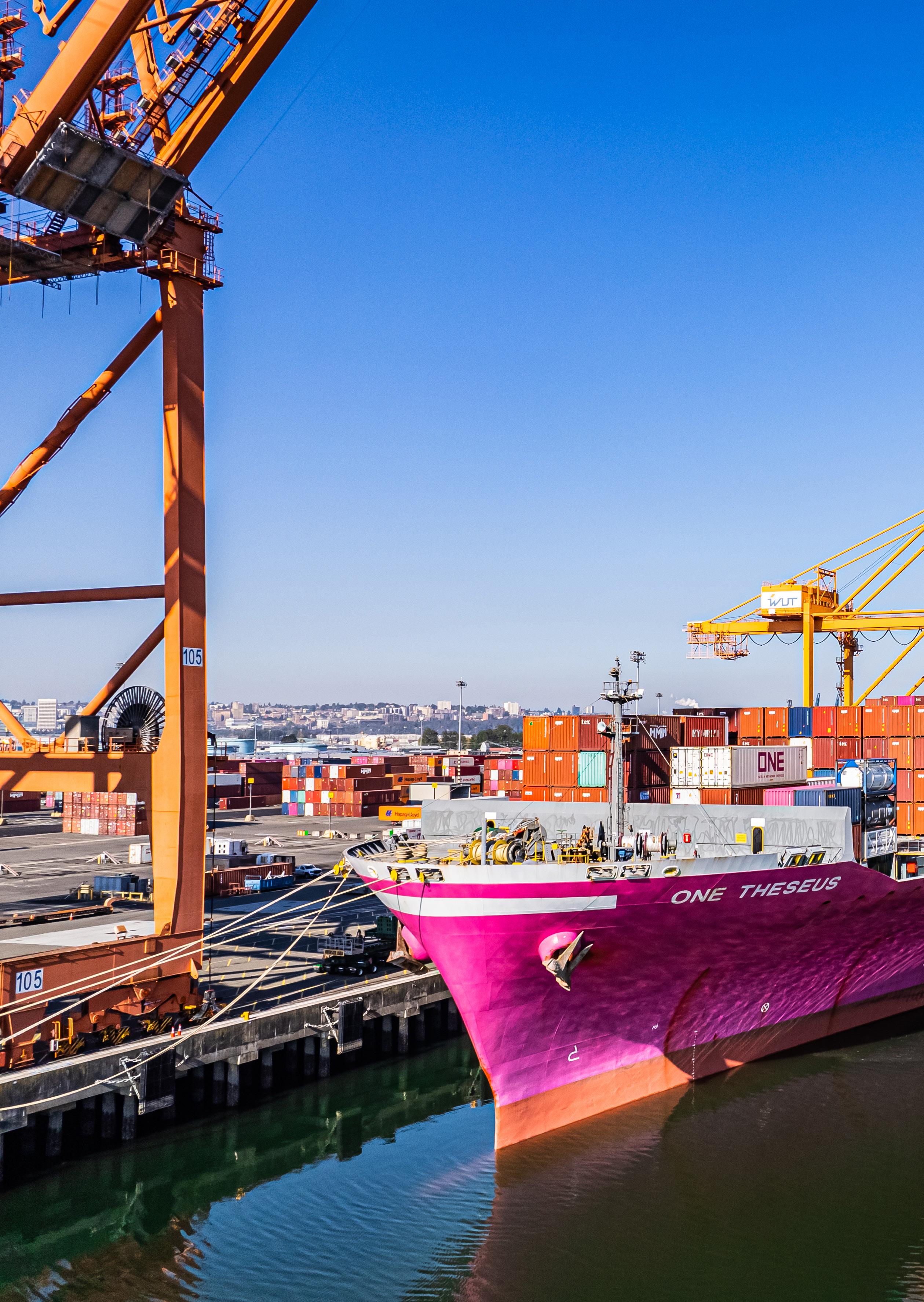 WRITTEN BY: SEAN ASHCROFT
WRITTEN BY: SEAN ASHCROFT

Fracht US has digitally transformed, improving life both for the company and its customers, says Darwish
Adi, VP of ITIn what must amount to one of the best-ever summaries of the business of freight forwarding, Darwish Adi, VP of IT of Fracht Group – United States says: “Basically, we’re a travel agent for cargo.”

He adds that, while people can get themselves to the airport, onto a plane and then through customs, cargo cannot.
There is far more to outsourced logistics than this, of course; there are quite literally thousands of moving parts in logistics at any given time.
Indeed, third- and fourth-party logistics providers (it’s the same thing as freight forwarding) have evolved significantly even over the past few years, with the pandemic prompting a faster pace of change.
Early in the pandemic Fracht – like all logistics providers – was faced with a shortage of capacity and rocketing prices. It was a tough time, Adi recalls.
“As a freight forwarder it gave us a huge challenge,” he says. “I mean, it’s embarrassing to go to customers and say that the same container you moved last week for $2,000 now will cost you $18,000.”
But latterly, he says, things have improved.
“Availability is up and prices are down. Capacity is improving, ports are less congested and the consumption is there,” he says, with a grin.
In today’s post-pandemic world, Fracht’s core business remains “our ability to
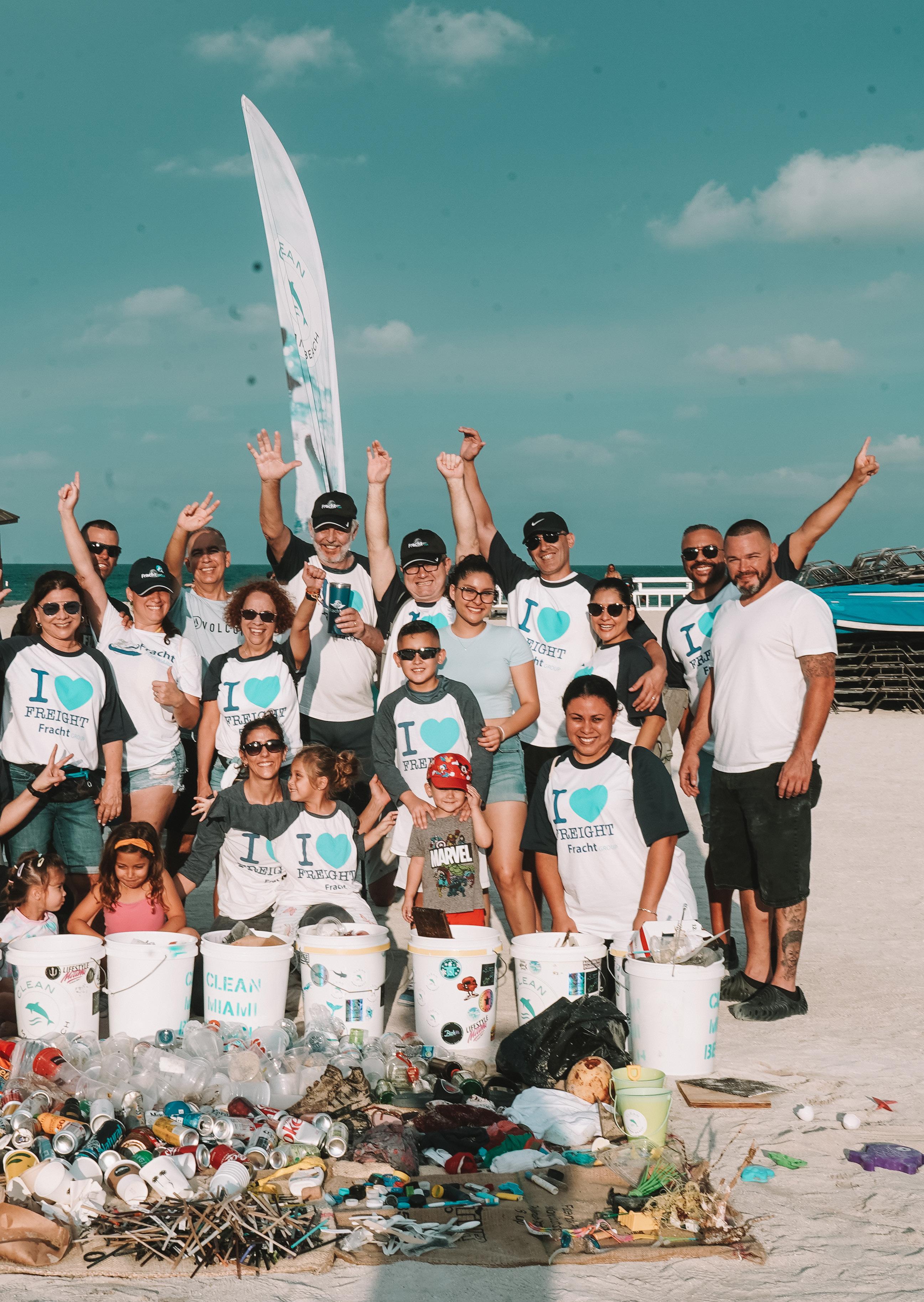
efficiently and safely move Freight around the world” but Adi adds that “what we are able to offer customers is changing”.
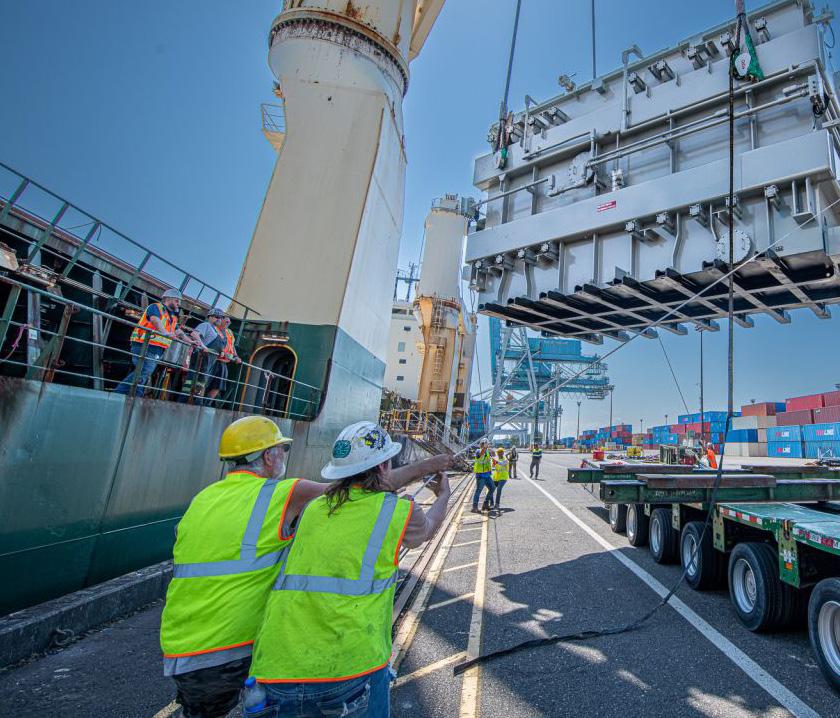
He says: “I would say that more recently we’ve come to be in the business of delivering information, alongside the product themselves.”
This change has been because Fracht US has undergone a digital transformation, which gives it better visibility of its
operations, and gives peace of mind to its customers, who want to know exactly where shipments are and if there are any problems.
“Customers depend on us to be aware that they have received orders from their own customers,” says Adi. “With that knowledge, we’ll start to prepare for when the product is actually produced, so that we can prepare for it and deliver it to their customer.”
“Basically, we’re a travel agent for cargo”
He adds: “So it starts with us being aware of our customers’ orders, and moves on to us arranging for the movement of such goods. Then we track it, and keep a record of where that product is in the world, at any one point until it is delivered to its destination.”
Along the way, plenty can happen to a shipment; the world has seen enough evidence of this over the past three years to last us a lifetime.
But over and above pandemic-fuelled disruption, there are the everyday problems that have always existed.
“Ships can miss a call in a particular port, or call to a port that wasn’t part of the schedule,” says Adi. “Keeping track of containers and

TITLE: VICE PRESIDENT IT
COMPANY: FRACHT
LOCATION: TEXAS, UNITED STATES
An IT executive with 24+ years exhibiting success leading global teams with demonstrated ability to deliver business value through the use of technology tools and methodologies. An experienced professional in the logistics, oil, and gas, and transportation industries. Excel at interpreting business strategies and devising plans to deliver solutions and services that are architecturally sound and user friendly. IT enterprise development leader and systems integrator capable


Enhancing customer experience and supply chain management for freight forwarding companies & customs brokers at Logixboard

Logixboard is a platform dedicated to enhancing customer experiences for the clients of LSPs. Their goal is to offer LSP clients improved visibility and selfserve insights through a comprehensive platform that unifies all workflows.
“It’s about working out how we help these customers gain new business and attract new customers,” Julian Alvarez, the CEO and Co-founder of Logixboard said. “How do we help them expand into their existing customer base by delighting them and offering them a better service than other competitors?”
LSPs spend a significant amount of time and effort providing visibility to their clients regarding the whereabouts of their goods. Managing this involves a maze of phone calls, emails, spreadsheets, and manual tasks. That’s where Logixboard helps streamline the entire process, leveling up how communications and steps are managed. “We’re able to take all the data that a freight forwarding
company has, complemented with third-party data, and put that online so that their customers can access it in real-time.” explains Alvarez.
Logixboard aims to empower operators to focus on high-impact tasks that drive the business forward, leaving the repetitive and automatable tasks to their digital solutions.


One of these successful collaborations has been with Fracht, a partnership that naturally clicked from the beginning. “It’s been a phenomenal partnership. In our two years of working together, Fracht has played a crucial role in shaping our product roadmap,” Alvarez shares.
Looking ahead, Logixboard aims to bring any and all underlying systems together into one seamless customer experience. “We envision providing a single, unified customer experience,” Alvarez reveals, “a single pane of glass where clients can effortlessly manage their entire supply chain in one place.”
The next 12 months hold exciting growth as Logixboard works relentlessly towards this vision.
goods is a big part of it. Customers look to us to provide that visibility.”
They also look to Fracht US to help validate invoices from carriers for services rendered.

Adi says that Fracht US also excels in “project cargo”.
He explains: “Let’s say the project is the building of an electricity generating plant. If we win the business, all of the equipment that it takes for it to become a plant becomes our responsibility to deliver.”
Many of Fracht’s customers are large, well-known global organisations, such as Siemens GE, Coca-Cola, Molsen and Coors. It’s these larger organisations that have a need to move many thousands of containers of products in any given year, but Fracht also
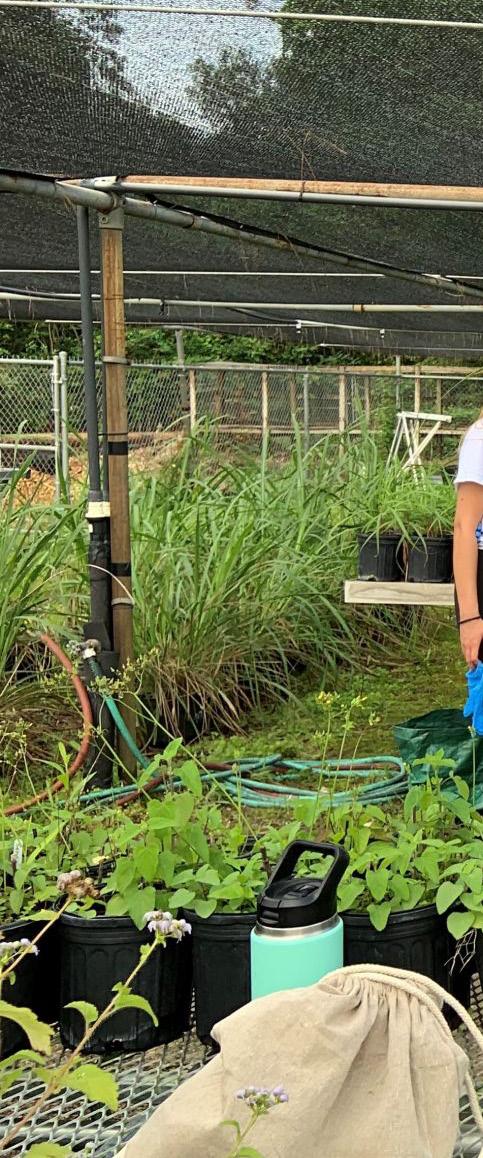
“Recently we’ve come to be in the business of delivering information, alongside the product themselves”
DARWISH ADI VICE PRESIDENT IT, FRACHT US
works with smaller, lesser known companies that are big players in their own markets.
Adi gives a large dairy product producer as an example. The US-based business produces cheese, lactose, whey protein and sweet whey.
“It supplies prepared and grated cheese around the world to customers and their dealers,” explains Adi.
He adds: “Our digital transformation has allowed such customers to find better ways to manage their own customers. One of their customers might be Pizza Hut in Vietnam, and they will need to rely on the cheese products to arrive when expected.
“Using our data, Our customer can let Pizza Hut know when to schedule everything, all the way down to forklift operators.”
Adi says technology has given Fracht US and its customers “a better-controlled distribution process”, which he adds “allows our customers to feel less stressed because they can watch orders being fulfilled for their own customers”. It has, he says, added value for Fracht customers.
Although Adi says Fracht is well advanced on its transformation journey, he points out that the process of change can never stop.

“All the core components of the transformation are in place, but in truth software never stands still, and the moment you stop enhancing and improving is the moment the software starts to degrade.”
Fracht’s transformation predates the pandemic; it already had its eye on using technology to support its customers for a while.
The initial steps it took made it easy for me when I came on board two years ago, in terms of coming to understand its goals, and to put a strategy forward that allows us to achieve those goals.
Adi’s journey to Fracht started 30 years ago, when he began writing programmes for a local warehouse company. People were impressed with his work and asked for more, and this allowed him to migrate from the warehousing side to the transportation and logistics side.
“Over the years, I’ve been introduced to many sides of the business in order to support various technology integrations,” he says.
This led to more leadership roles for him within the technology space, always for the logistics industry. “So although I am a technologist, my entire career has been in logistics,” he says.
He says the most challenging part of the job are “the ever-changing regulations in our industry”, and adds: “You’re shipping between the US and Europe, or US and Asia, and navigating all the regulations and staying on top of all that is the challenge.”

But he has many good people around him, and Adi and his team have been able to hit greater heights since Fracht US digitally transformed its operations.
“It’s made a tremendous amount of difference to us as a company,” he says. “For example, rather than mostly spending our time on data entry – and trying to keep up with the mountain of documentation that comes with each shipment – we now are managing a lot of this behind the scenes, electronically system to system.”
Adi says that when he first joined the company two years ago, the number of employees more than doubled.
He adds: “The impact of the transformation is visible not just by the numbers of
Fracht has moved over 300,000 TEUs and more than 10 million kilos via air freight every year for the past decade



Our proprietary solution requires no custom configuration, it is as easy as creating a user login.
You can be up and running in days with full historical and real time updates across all modules.


employees but also by the amount of throughput they are able to process.
“For example, our Atlanta office didn’t necessarily increase its staff much but the goods that they move has more than doubled, and that was possible because we had the technology needed to process everyday records.

“Technology has given our people extra time to spend with customers and this allows them to better manage exceptions, rather than having to manage each and every shipment.”
Adi continues: “We don’t want to look at 250 shipments that are in-flight at any given moment. We only want to look at the five that are facing a potential delay. This allows us to offer a better service to our customers.”
Adi is immensely proud of his team.
“They inspire me,” he says. “They’re exceptional individuals. We have some really strong leaders, and watching them day in, day out – producing products, connecting people and solving problems for our business – makes me want to do my role even better. It makes me want to support
“Customers depend on us to be aware that they have received an order from their own customers”

“Digital transformation is allowing us to tap into markets that we haven’t traditionally served”
DARWISH ADI VICE PRESIDENT IT, FRACHT US
them, and showcase them to the world as individuals who do what it takes to support our business and our customers.”
And those customers are beginning to change, thanks to new markets opened up by the transformation
Adi says: “It is opening doors for us, and allowing us to tap into markets that we haven’t traditionally served, especially in terms of how we can serve industries that need to rely less on traditional energy sources. So we’ve got into solar panel distribution, and are supporting our customers in that now.
“I would say we’re growing very strong in that space – of delivering solutions for companies that are responsible for enhancing the use of solar systems for generating electricity.”
Same travel agent. Different cargo.

Volvo Trucks is leading the way in EV production for logistics sector, as businesses like DHL Supply Chain and DFDS add e-trucks to their fleets
 WRITTEN BY: SEAN ASHCROFT
WRITTEN BY: SEAN ASHCROFT
IMAGES: VOLVO

IN 2020, THE GLOBAL MARKET FOR ELECTRIC TRUCKS REACHED US$392m AND IS EXPECTED TO HIT $3.8bn by 2030

Electric Vehicles (EVs) help businesses reduce their carbon footprint, improve local air quality and provide a better driver experience. They also limit reliance on volatile fuel prices, creating potential cost savings in the long run.

All of these are of course of benefit to the logistics industry, which – if it is to achieve net zero carbon emissions by 2050 – will have to significantly increase its use of EVs. For this to happen, market conditions must be favourable, and the signs on this front are at least encouraging.
In a recent report, called ‘What’s sparking EV adoption in the truck Industry?’’McKinsey says “the time for EV technology is ripe”, and goes on to list three factors that are set to support the e-truck market through to 2030:
The total cost of ownership between e-trucks and diesels is growing smaller EV technology and infrastructure is becoming more cost competitive and available. The regulatory landscape is driving adoption, with country-level emission regs to the fore.
At the same time, says McKinsey, barriers to e-truck take-up rates still pose a challenge. The paper talks about how new vehicles must be proven to be reliable before mass adoption takes place, and that employees, dealers, and customers require training around EV use in the workplace.


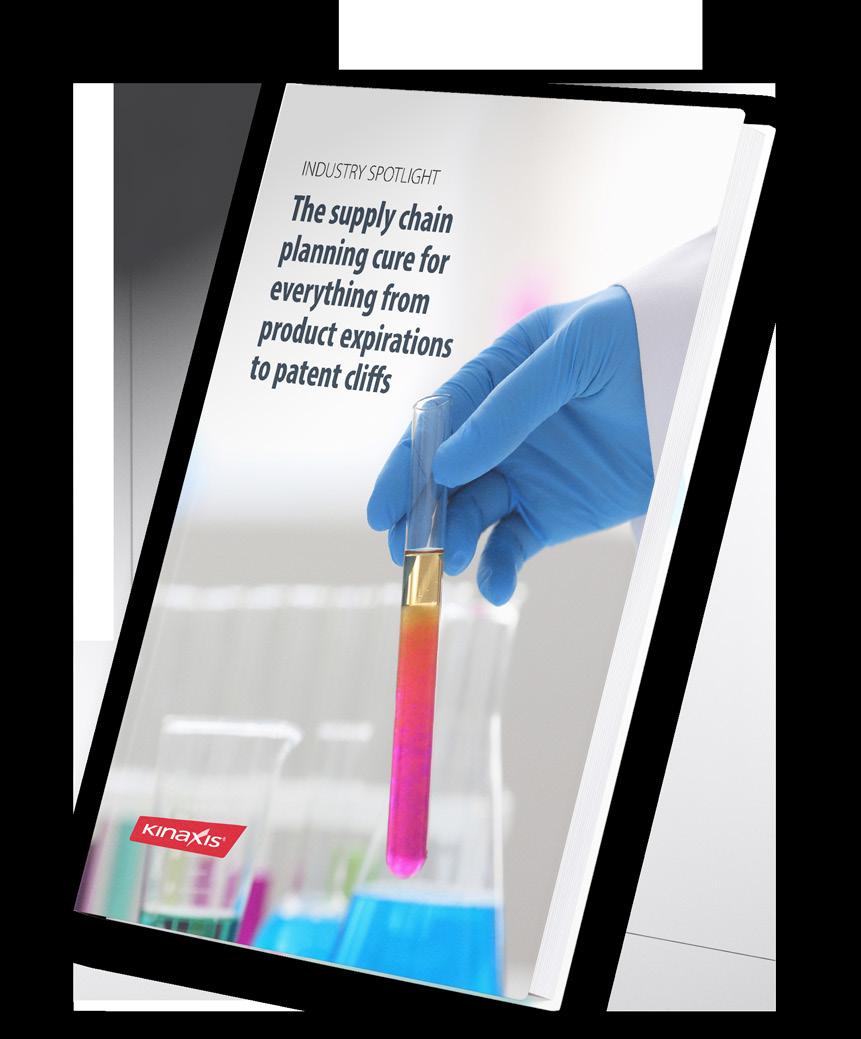
McKinsey’s research concerns three classes of battery-electric commercial vehicles: light-duty trucks (for urban use); medium-duty trucks (regional use) and heavy-duty trucks (long-haul).
It says it expects to see strong uptake of BECVs in the light- and mediumduty segments. It adds that, with the expansion of low-emission zones in major cities, BECVs could reach 15 to 34% sales penetration by 2030.
However, it sees lower take-up in the heavy-duty class because of high battery costs, which affects total cost of ownership, but says tighter emissions regulations, increasing customer confidence and a more established charging infrastructure will drive adoption in all EV BECVs classes after 2025.
In 2020, the global market for electric trucks reached US$392m, and if McKinsey is right about adoption increasing, it should be set to hit the $3.8bn mark by 2030. Widespread EV integration is an inevitable byproduct of the push toward sustainable transportation.
In February 2023, Uber Freight announced a pilot program with WattEV, which will leverage a digital freight network to connect shippers with an all-electric heavy-duty transportation platform.

WattEV will provide electric trucking capacity to Uber Freight shippers on select routes in Southern California, starting with CHEP. The pilot is a key milestone in electricpowered transportation.
In Europe, too, there are signs that logistics is embracing EV solutions.
TITLE: HEAD OF LOGISTICS DIVISION
COMPANY: DFDS
INDUSTRY: LOGISTICS
I am an expert in logistics services,” Andersson says. “I have a special interest in just-in-sequence transportation, and have deep experience in logistics contracts, including cross-docking and warehousing.”



Niklas Andersson
“It’s important to work with energy providers and industry leaders to make our climate ambitions a reality”
NIKLAS ANDERSSON, HEAD OF LOGISTICS DIVISION, DFDS
Denmark-based DFDS is Northern Europe’s largest shipping and logistics company, with 8,000 employees across 20 countries. When it comes to deploying electric trucks in its fleet, DFDS is in the vanguard of logistics companies.
In December 2021, it placed an order with Volvo Trucks for 25 heavy electric trucks, on top of the 100 Volvo FM electric trucks it made in October of that year. Earlier in 2023, 20 of those trucks debuted in its commercial fleet.

Yet Niklas Andersson, DFDS’s Head of Logistics Division stresses that – although the e-trucks will have a “significant impact on our carbon emissions” – moves to decarbonise the wider logistics industry requires “much more than financial investment”.


“We’re proud to lead the way in electric commercial transport”
SAUL RESNICK, CEO, DHL SUPPLY CHAIN UK & I,
TITLE: CEO
COMPANY: DHL SUPPLY CHAIN UK&I
INDUSTRY: LOGISTICS
Resnick says of his current role: “I’m excited to be leading the business in an era when supply chains have become recognised for their importance to the economy, and have become a focus in corporate boardrooms across the world.”

He adds: “It’s important to work with energy providers and industry leaders, like Volvo Trucks, to make our climate ambitions a reality. The transition requires the right infrastructure and cooperation across various areas of society. It cannot be achieved by working alone,” he says.
Andersson also says the sale of e-trucks has been hampered by availability and cost issues, as well as by battery size.
“The size of batteries required to give sufficient power and range is an obstacle when it comes to electrifying one’s fleet,” he says.
DHL Supply Chain’s e-trucks move DHL Supply Chain is another logistics business to introduce the first fully electric trucks to its UK fleet. The Volvo FM electric trucks are designed for high-capacity deliveries, operating at 40 tonnes and will replace polluting diesel vehicles on a range of activities.
Featuring Volvo’s largest 540kWh battery, which provides 666hp, the zeroemissions trucks have a range of up to 180 miles (300km), allowing them to complete full round-trips servicing DHL’s retail and automotive customers across the UK.

DHL Supply Chain CEO Saul Resnick says the new trucks “mark a key milestone in our journey towards alternative fuel vehicles and net zero goals.
He adds: “The size and capability of these trucks make them a truly viable alternative to diesel as they fully meet our needs and those of our customers.
Saul Resnick

“Following our introduction of the UK’s first 16-tonne rigid electric truck in late 2020, we’re proud to continue to lead the way in electric commercial transport.”
“Early feedback from drivers has been extremely positive, especially with regard to acceleration and hill performance,” Resnick added.
Speaking to Supply Chain Digital upon his appointment in September 2022, Resnick said the company’s net-zero roadmap was “a major business priority”, and that it would be “focused on the long-term benefit, not just the short-term return”.
As well as EVs, DHL Supply Chain UK & I, is also accelerating its investment in gas trucks and plans to have 500 gas-powered vehicles operating across its fleet by 2025.
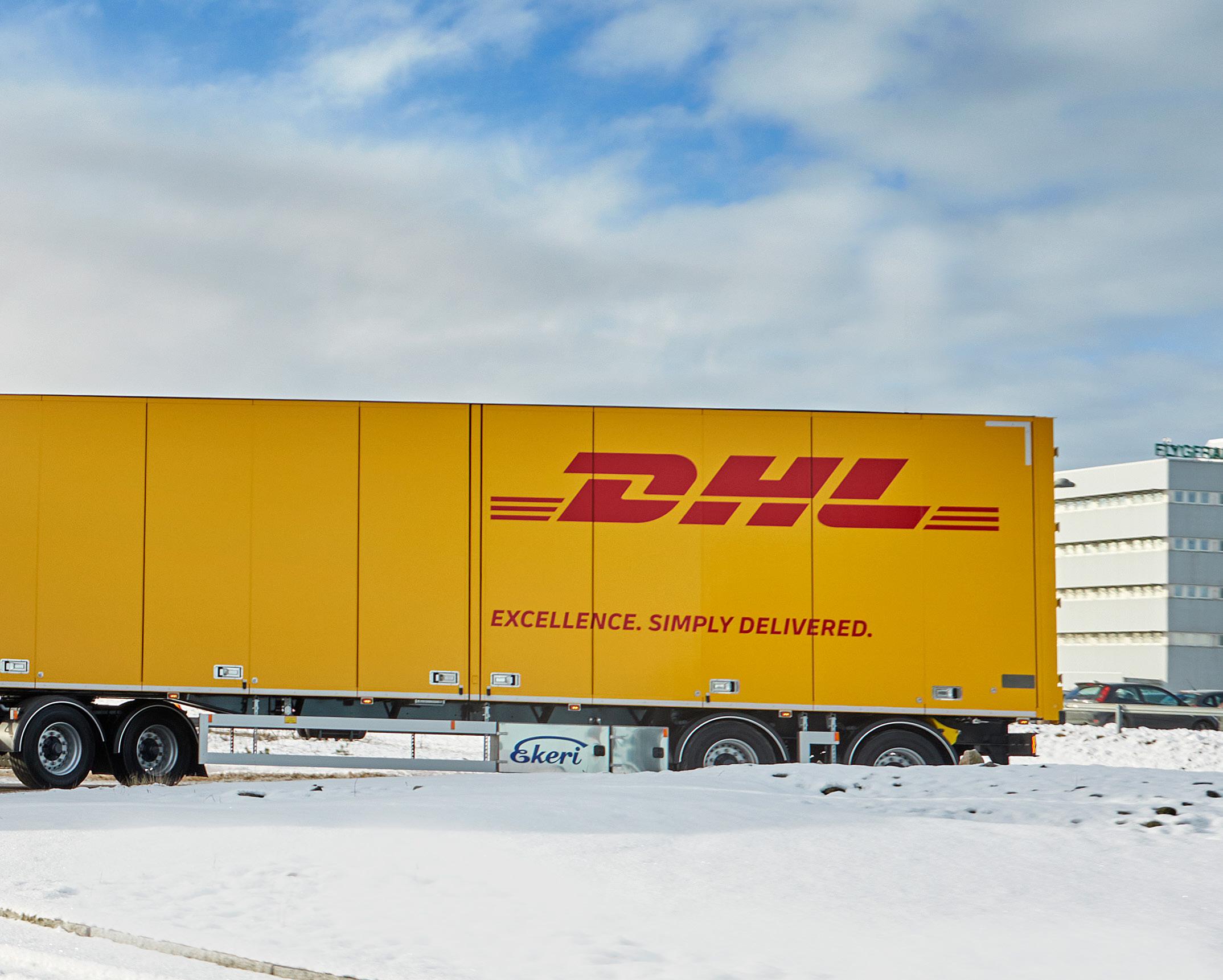
As the DFDS and DHL Supply Chain initiatives suggest, it is Volvo Trucks that is blazing the EV trail in logistics, with the company now having sold 4 300 electric trucks globally across 38 countries.
In Europe, it is the market leader, with a 32% market share, while in North America nearly half of all heavy electric trucks registered in 2022 were Volvos.
“Feedback from drivers has been positive, especially around acceleration and hill performance”
SAUL RESNICK, CEO, DHL SUPPLY CHAIN UK & I,
 WRITTEN BY: TOM SWALLOW
WRITTEN BY: TOM SWALLOW

PRODUCED
STUART IRVING
BY:
Take thousands of employees, produce hundreds of beer brands, and then distribute all across the world and you’ve got yourself a very complex operation that exceeds US$55bn in revenue with the need for an intricately built supply chain. This is where Anheuser-Busch (AB) InBev has excelled over more than a century – becoming the big-name business that it is today – thanks to its ability to manage a global team and expand in line with current trends and demands within the industry.

With this growth comes expansion and AB InBev acquired South African Breweries (SAB) Ltd in 2016, a major step towards sharing its great products with more consumers across the country – serving more than 55 million of its population. Particularly in the current commercial landscape, procurement has come to the fore as a crucial component of expansion and ensuring compliance to environmental, social, and governance (ESG) throughout the supply chain.
To understand the important role of procurement in operations at AB InBev, we look to the Southeastern region of Africa, where the company boasts a great influence on Uganda, Tanzania, Zambia, and other countries through quality procurement processes as the company looks to localise its sourcing.
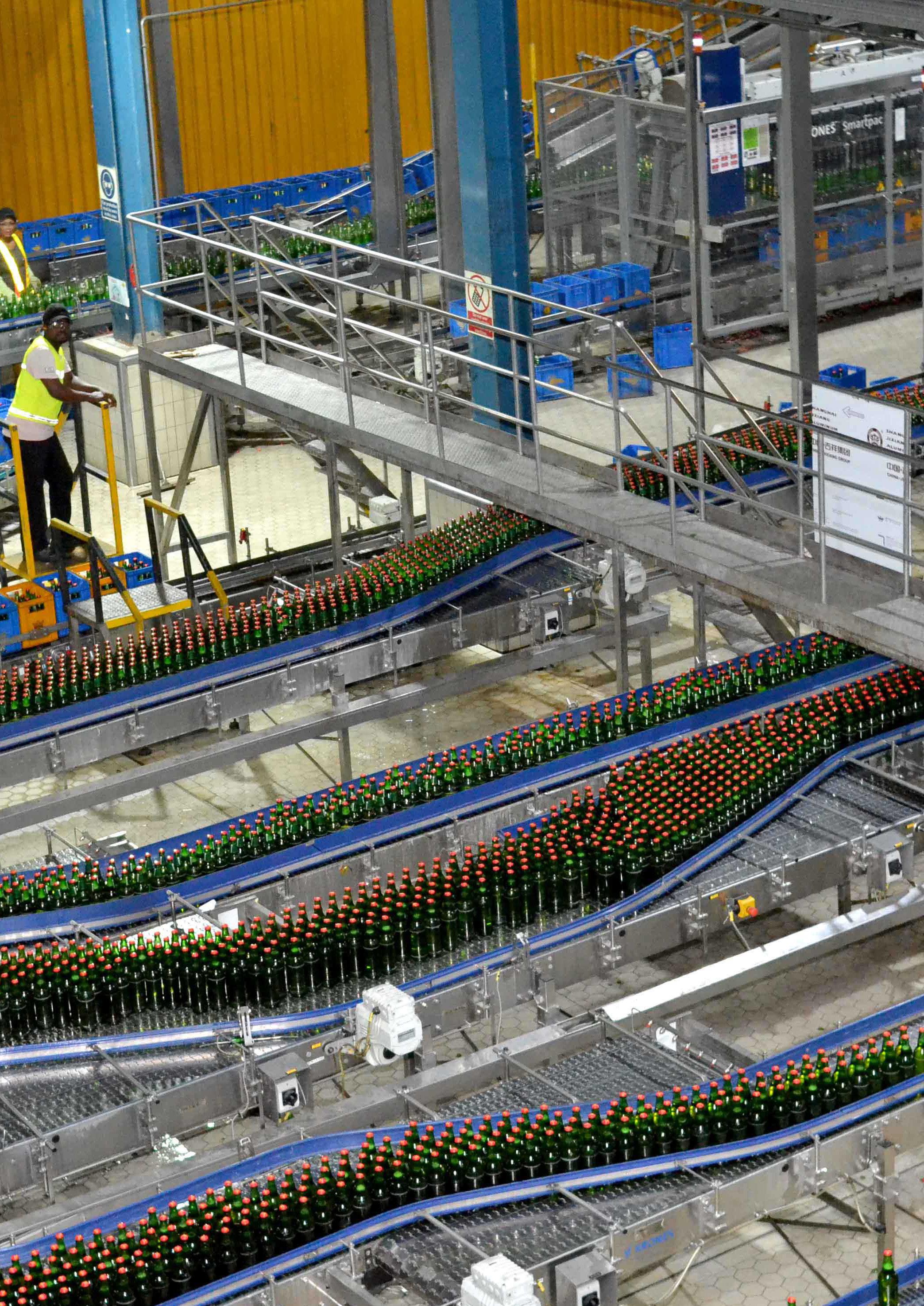
With breweries in 11 countries on the African continent and a number of local agricultural programmes across half of them, the company is very much driven towards localisation to provide products to the African market. While providing more opportunities to the local farmers in this area, procurement has a role to play in developing the business for the modern industry.
“Procurement within AB InBev has evolved immensely,” says Jacques Els, Procurement & Sustainability Director: BU Southeast Africa. “As the company has modernised, procurement started to evolve within the business purely because of the value procurement can generate for the bottom line.

“We know industries, specifically in Africa, are struggling. Economies are not growing
to the level we would like them to, and therefore the bottom line becomes more and more critical.”
Now that procurement has ‘a seat at the table’ within AB InBev, Els believes that new levels of value will be reached now the department has become more influential in the business’ growth. Els really emphasises the importance of procurement as a function leading the business in a number of areas, including social aspects of enterprise as well as profitability for the overall African segment.
“Our procurement function has been elevated within the business and it’s become even more apparent since we started thinking about the principle of supply chain, which is essentially production, logistics, and the procurement organisations all under one umbrella.
TITLE: PROCUREMENT & SUSTAINABILITY
DIRECTOR: BU SOUTHEAST AFRICA
COMPANY: ABINBEV
Jacques Els, Procurement & Sustainability Director for ABInbev Africa’s South- East Africa Business Unit has been part of the Beer giant’s Procurement function for eight years. Having held various positions within the Procurement function in Africa Zone, from Operational Implementation to Sustainable Development of Sourcing and Security of supply strategies.
Prior to his career at ABInbev, he has held Consultancy and Operational Supply chain roles within the Power generation and Logistics industries in Africa.
The core of Jacques responsibilities over the past eight years has been the consistent drive to develop supply chain maturity, localisation of strategic industries and driving Sustainability initiatives to support business results. His experience on the African continent, including relocation to Tanzania for 3 years has enabled him to deliver consistent results to the bottom line, whilst continuing to grow a robust supply chain within Africa.


Water scarcity poses a huge global challenge to brewers. In one of the most water intensive sectors, it’s crucial to ensure that every drop of this increasingly precious resource is maximized.
Water management impacts every operational aspect, including a brewer’s reputation with customers, the communities in which they operate, and future investment. Inefficient water use is increasingly viewed as unjustifiable, and a barrier to the business resilience necessary for success in a world of increasing water scarcity.
Diversey manage hygiene and water quality as a complete system. Through an ongoing consultative partnership delivering innovative programs and technologies, we apply efficient reuse, recycling, and wastewater treatment, while adding value that drives differentiation.
Our systematic total approach to water management begins by creating a complete picture of water use. AquaCheck uses three clear steps, where data of historical water patterns is collected and analysed to identify areas for monitoring. Priorities are determined and the scale of opportunity assessed for water savings, and in reducing risks from scarcity and rising costs.
As a responsible brewer, ABInBev makes water conservation its highest priority, while maintaining the vital balance between remaining competitive and reaching its sustainability and ESG goals. In partnership, Diversey’s engineering capabilities and treatment technologies were tasked with defining a broad overview of water use.
This analysis was then applied in a successful recycling and water-saving project for the bottlewasher operation in one of the company’s South African facilities. Final Rinse water is recycled to the pre-rinsestep by design to help pre-rinse effectiveness. And then the excess water that goes to drain after pre-rinse is collected, treated, and disinfected to a standard suitable for use in crate washing and floor cleaning. And as per requirement, recycled water cannot be used in areas where it can be in contact with the product.
Working together, Diversey’s tailored balance of knowledge, expertise, advanced chemistry, and equipment technology achieved water savings of 30k m3 per year to significantly increase efficiency and support ABInBev’s sustainability aims.
Further resource savings have been realised by implementing solutions from Diversey’s KBS service portfolio, including Divos X5 membrane cleaning, delivering reduction water, raw caustic and formulated chemical consumption, while increasing beer throughput and process efficiency.
Discover more about how Diversey can help you reach your water saving goals:

“This supports the understanding that the supply chain can deliver value within your business.”

And for AB InBev, the supply chain is everything. From the sourcing of raw materials like wheat and barley from a variety of farmers, to retaining production efficiency and product quality across new markets and distributing beer to countries across the continent. Let’s also not forget the sustainability requirements within the supply chain, which adds a new layer of complexity to the procurement role – sourcing goods provided using sustainable energy.
Commercial perspective: Retaining necessary product quality of global products
The commercial value for AB InBev comes from several factors in the supply chain. As the company operates on a localised basis, product quality and cost optimisation are crucial outcomes the business strives for when dealing with multiple breweries that produce the same great products.
The procurement function is responsible for ensuring that not only the products meet the company’s legacy – high-quality – standards, but are produced in a costeffective, equitable way.
“When you look at industrialisation in Africa’s markets, procurement is critical. It plays a critical role in developing suppliers to deliver at the right quality; the consistency from suppliers on a multinational level,” says Els.
“Localising suppliers so that we’re not so reliant on global supply chains – ocean freight from Chinese, European or American ports – has become a huge value-add for us, because we are able as a procurement team to do that faster and quicker than most of our competitors.”
What Els explains here is that, also due to the global events of the past few years, localisation has been a natural shift for the business and procurement is at the heart of achieving this to create a more resilient supply network to overcome such events in the future. This is crucial for commercial longevity, but, particularly in Africa, a staple procedure that will bring more local businesses into the fold, and effectively provide support to small and medium businesses in a country of a developing economy.
Community perspective: Developing local business through procurement and commerce
Sustainability being the hot topic across the globe, AB InBev embraces this with open arms across all areas of its business and all factors related to operations. These of course include sourcing sustainable energy and supporting the communities in which it operates.
Bringing on board local businesses in Africa as the suppliers of AB InBev products across the continent creates a full cycle of development and reward both commercially and socially.
One of the main functions of procurement is bringing in small vendors and aligning them with its global standards, which, according to Els, requires a phased approach to avoid mistakes along the way.

“You grow local businesses, you develop the area they operate in, and you deliver more quality from those businesses”
630 Unique beer brands
175 Breweries
63% Of revenue from digital

As the company’s commitment to ESG and the UNSDGs stands, the success of farmers in Africa is within its best interests.
“The mistake made in the past is to try and go all-in at once,” says Els. “It’s about developing your local suppliers while maintaining the relationship with your international supply. We ensure that standards, training, quality, health and safety are top of mind before even talking about increased volumes, pricing, quality, and begin by making sure operations are aligned with the attributes we expect from any business globally.”
Not only does this strategy help to build resilience across the business, but allows AB InBev to make its mark, by providing suppliers with new markets and better ways of working.
“This is how we create value for the communities in which we operate,” says Els. “You grow local businesses, you develop the area they operate in, and you deliver more quality from those businesses that can supply others outside of AB InBev.”
In creating this value for Africa’s communities, Els also sees how localisation forms a breeding ground for new and innovative ways of working, thanks to its diverse pool of suppliers.

“We had to be the catalyst to prove to the business what is available out there with an entirely interlinked supply chain,” says Els. He also reiterates that procurement is not a supporting function, as he explains “as soon as this started happening, little by little we could see the mindset shift.”
Embedding the procurement team with suppliers across the countries seems to have empowered AB InBev to take more steps towards more sustainable methods of working. By getting closer to its suppliers, the South African team learned very
quickly what the pain points were for small companies looking to develop more responsibly.
“As soon as the procurement team started taking over sustainability as part of our business initiatives within our supply chain – renewable energy, water usage, climate change, etc – suddenly everyone realised that what we’ve missed is that additional supply chain value that procurement has access to,” says Els.
“Globally procurement developed, but within the group it was us as a team really embedding our value in the business.”
Regulatory perspective:
The regulation hurdle of localisation Returning the focus to operations, the hurdles overcome by the procurement team at AB InBev are what make it a crucial department for the team to embrace globally. Looking at the company’s African expansion, regulation is a key factor to contend with when trading across multiple countries.

As a commercial endeavour with economic benefits, Els prides his team’s efforts to accelerate legislation to improve trade across Africa, which consists of duties and taxes that hinder progress of executing its processes in this area of the supply chain.
“You still find challenges between different African countries that do affect efforts to efficiently speed up and execute some of these localisation initiatives and inter-trading initiatives,” says Els.
“Also, when you look at the sustainability side, when it comes to recycling plastics and the way the governments interact with businesses, it sometimes feels very reactive. We do find ourselves sometimes having to react very quickly to bans on plastics; legislation changes that come across overnight.”
Overcoming myriad challenges from the project inception to execution is where Els’
JACQUES ELS PROCUREMENT AND SUSTAINABILITY DIRECTOR: BU SOUTHEAST AFRICA, AB INBEV“Our procurement function has been elevated within the business and it’s become even more apparent”
journey with the company has taken him – since working with SABMiller in 2015 to his position at AB InBev. Now he sees the company operating with a network of 11,000 small, older farms across his home continent, which is testament to the company’s procurement function and a natural move as the supply chain becomes an important focus from global success.
As part of the team that catalysed major changes there, Els continues to support these endeavours and will allow further relationship building, sustainability implementation, and commercial growth for his company and those trading with the business.
Through further partnerships, procurement continues to duplicate these achievements across a number of countries, bringing them into an ever-growing partner network.
Moving forward with its vendors, AB InBev can use its platform to facilitate further industry shifts and will be a driving force in reducing supply chain impacts on the planet and enhancing the lives of those affiliated with beer business.

IIoT technology is improving productivity and efficiency in manufacturing and supply chain, and works best when there is stringent data discipline
WRITTEN BY: SEAN ASHCROFTThe benefits to supply chains of Internet of Things (IoT) technology are substantial, and include increased visibility, more collaboration, better customer service and real-time tracking of goods.
Forward-looking organisations are increasingly turning to IoT networks to transform complex supply chains into fully connected networks. Sensor data and Radio Frequency Identification (RFID) from such devices can deliver real-time asset tracking, monitoring, and alerts that help streamline tasks and minimise disruption.
A subset of the IoT – which consumerfacing uses such as wearable devices and smart home technology – is the Industrial IoT (IIoT).
This consists of internet-connected machinery and advanced analytics platforms that process the data generated by IoT devices, which range from tiny environmental sensors to complex industrial robots.
Although the world ‘industrial conjures images of warehouses, shipyards and manufacturing production lines, IIoT
In manufacturing IIoTenabled machines can self-monitor and predict potential problems, meaning less downtime and greater efficiency


technology is revolutionising a range of industries, including agriculture, healthcare, financial services retail and even advertising.
For businesses that produce or transport physical goods, IIoT tech can offer significant efficiencies, and can help businesses reimagine operational modus operandi.
In supply chain, for example, sensormanaged inventory can automate the supply ordering process, just before items go out of stock. This reduces waste and frees up employees to focus on more-strategic tasks.
In manufacturing IIoT-enabled machines can self-monitor and predict potential problems, meaning less downtime and greater efficiency.
But IIoT having the potential to help, and it actually helping, comes down to one critical factor: data. Or, more specifically, how data is harvested, and then used.

TITLE: GLOBAL VP CENTRE OF EXCELLENCE
COMPANY: SAP DIGITAL SUPPLY CHAIN
INDUSTRY: IT SERVICES

Hancock says of himself: “I strive to drive our business forward by making sure our customers can make informed decisions on the future of their businesses.”
Andy Hancock is Global VP Centre of Excellence, SAP Digital Supply Chain. The Centre of Excellence is like a global SWAT team of industry experts, serving SAP colleagues in the field, with knowledge transfer.
Hancock points out that IIoT networks generate mountains of data and warns that powerful 5G technology – with its huge data capabilities – can “make people lazy, and so they end up throwing tons of information around just because they can”.
He adds: “The trouble is that when you scale-up this approach to enterprise level you soon end up with 50 million data points that flood the network, making it inefficient.
He adds that the danger is that businesses who fall into this trap then end up “chucking more technology at the problem”, where really what they should be doing is “coming back to fundamentals”.
Hancock says the secret to working with big data, like that generated by IIot networks, is “to always be looking out for exceptions”.
He adds: “Think of a temperature gauge on a piece of equipment that is feeding back data. As long as everything is running okay, the equipment will always be roughly the same temperature.
“Data is all about identifying exceptions, rather than recording everything”
ANDY HANCOCK GLOBAL VP, CENTRE OF EXCELLENCE, SAP DIGITAL SUPPLY CHAIN
Develops software and services that accelerate industrial process analytics on industrial process data. The company’s analysis tools are used for industrial markets like oil refineries, pharmaceuticals, and energy production. Based in Seattle, the company holds offices across the western United States and Canada.
As a provider of Industrial IoT application infrastructure Toshiba is helping to change industries, including mining, oil and gas, healthcare, hospitals, agriculture, food and beverage. “Our biggest challenge is to make IIoT and cyber physical systems a business initiative for our customers,” says Hiroshi Yamamoto, Toshiba’s Corporate Digitisation Chief Technology Officer.
Manufactures everything from air conditioning units to escalators and automation systems. Using IIoT tech Mitsubishi allows businesses to conduct shop-floor monitoring, where machines and pieces of electrical equipment from different manufacturers can communicate.
Recognised as the world’s most sustainable company in 2021, Schneider Electric’s IIoT technology allows developers to rapidly customise, and offer over-the-air updates and software reuse of a wide range of IIoT products. Thanks to Schneider, developers are ushering in a new era of energy infrastructure.
Technology giant Siemens is focused on infrastructure, transport and the healthcare sector. It is currently working with information and comms tech services and solutions provider Detecon Al Saudia to bring IIoT to the Kingdom of Saudi Arabia, just as it has to other regions in the world.
He says: “You don’t need to keep feeding back data about that piece of equipment. The only data you want to capture is if something changes – for example, if the thermostat fails.
“IIoT devices are creating data 24/7, so the idea is you discard most of it and look for the exception - the piece of data that shows a machine is overheating, or out of calibration. With data, less is usually more.”
Hancock says businesses who are harnessing IIoT tech should treat their networks in the same way the world treated modems, back when the Internet was in its infancy.
“Think back to the days of dial-up modems,” he says, “where everyone minimised the amount of data transmitted, because if you didn’t then the whole thing just hung”.
As well as focusing in on data exceptions, Hancock says IIoT operations benefit hugely from edge computing, which is a distributed computing model that brings computation closer to the sources of data – a warehouse full of inventory, say, or components in a vitally important production plant.

“If you have local processing power it can be invaluable,” Hancock says. “For instance, if a machine is going out of tolerance at a paper mill and there was a delay in sending this data to the cloud and back, then you could have lost a hundred metres of product by the time the machine is switched off.
“So the idea is that local machine-learning tech understands that the machine is out of tolerance, and recalibrates it without any human action needed.”
TO THE LATEST AVAILABLE DATA, THERE ARE APPROXIMATELY 15 billion CONNECTED



26 - 27 September 2023
Business Design Centre, London
SPONSORSHIPS GET YOUR PASS